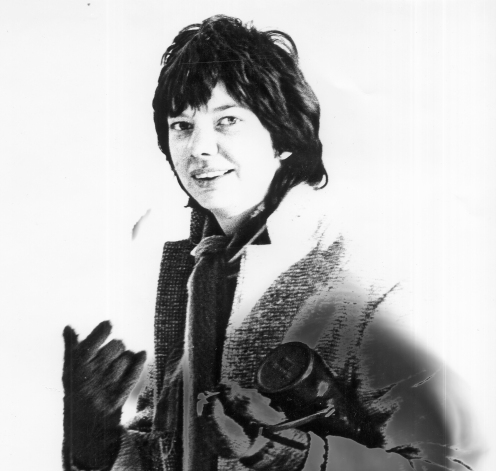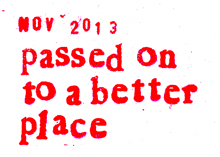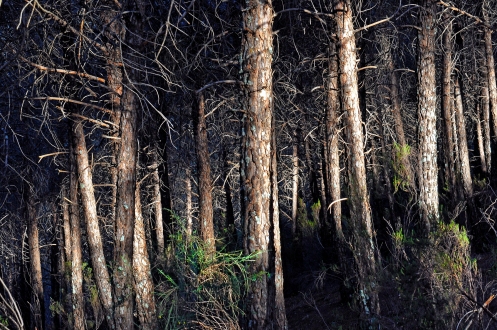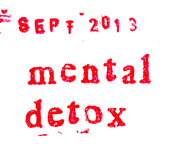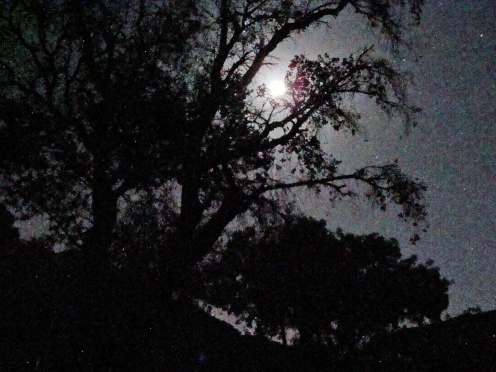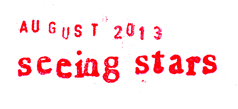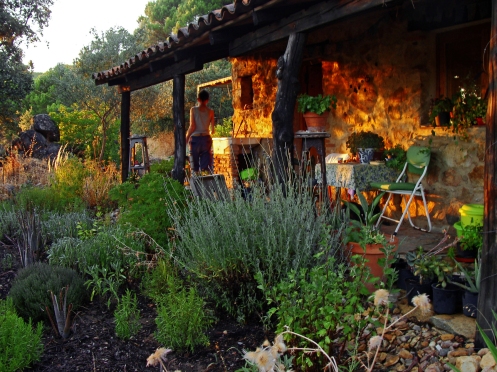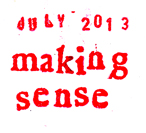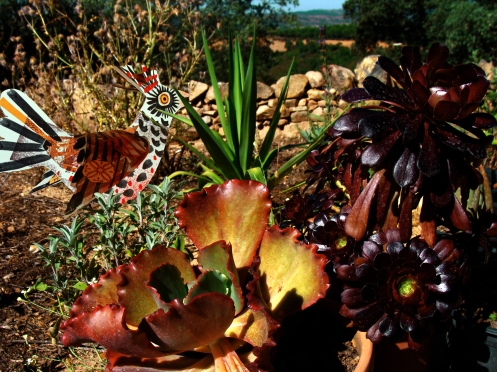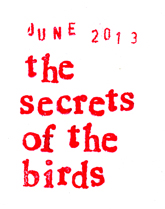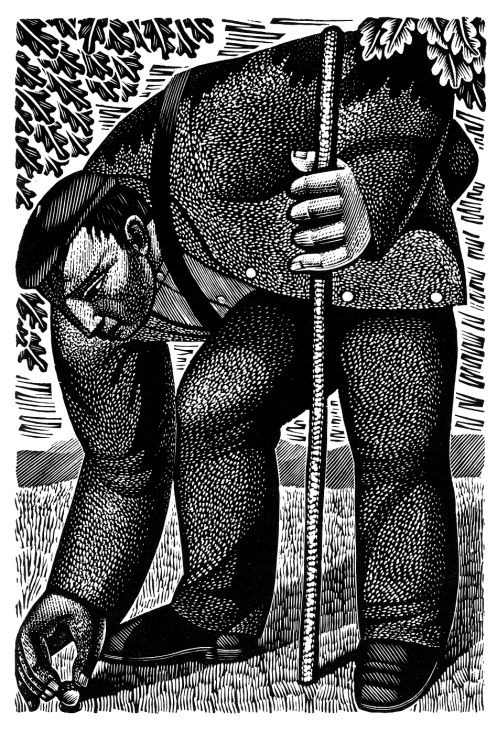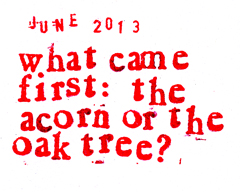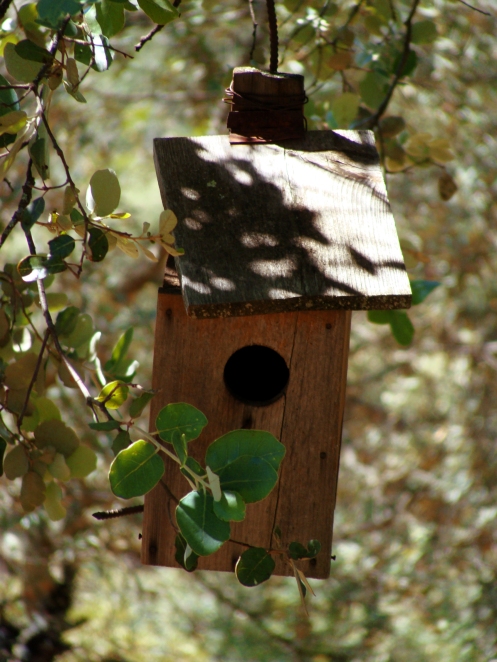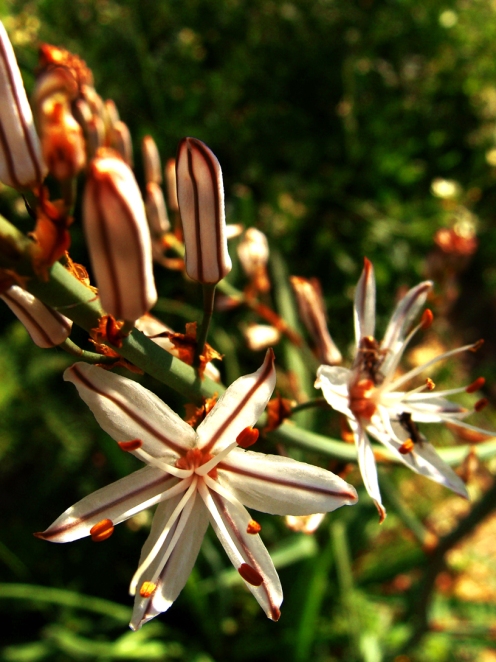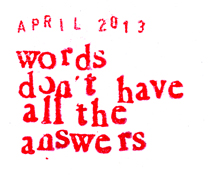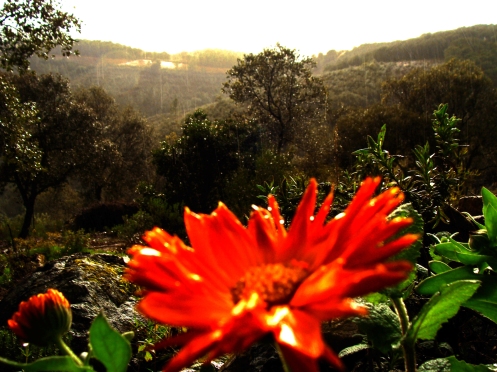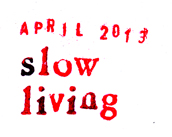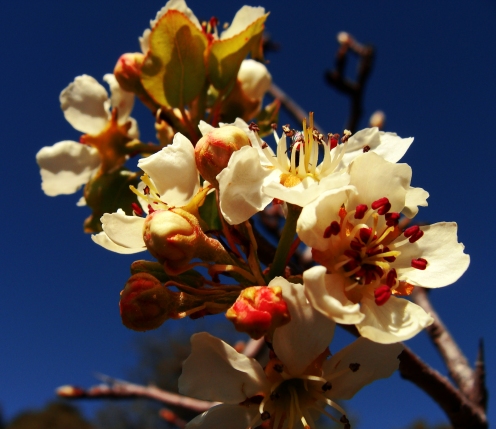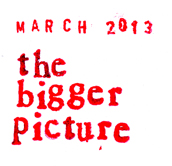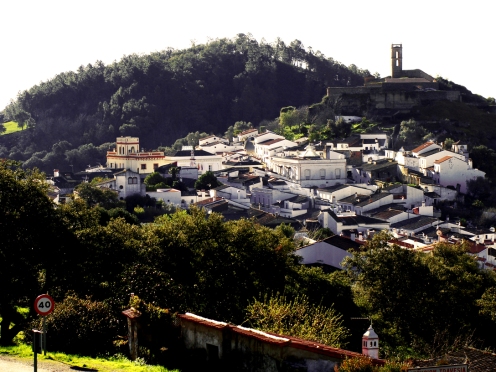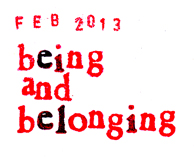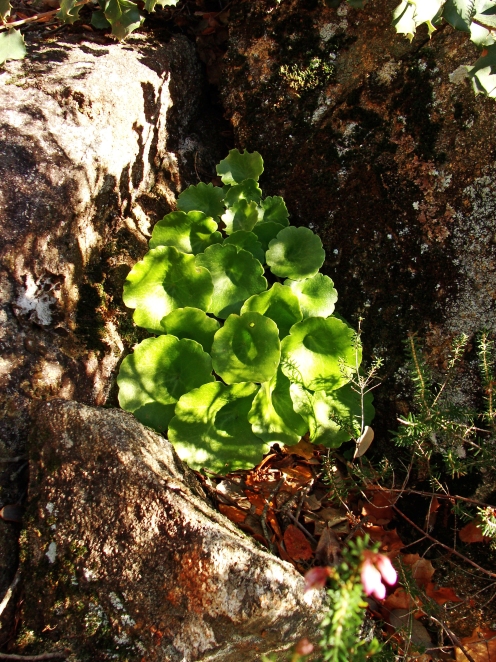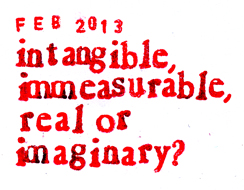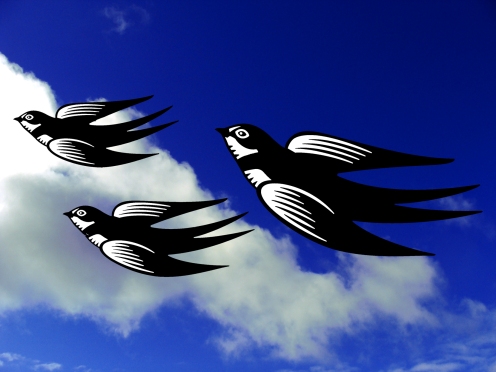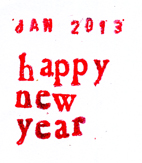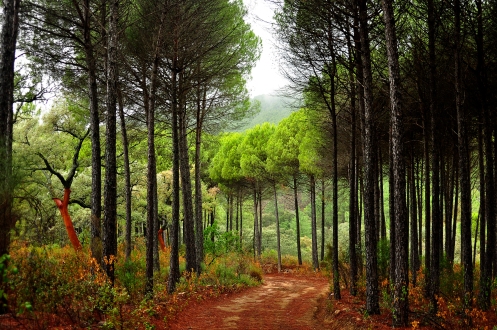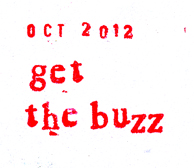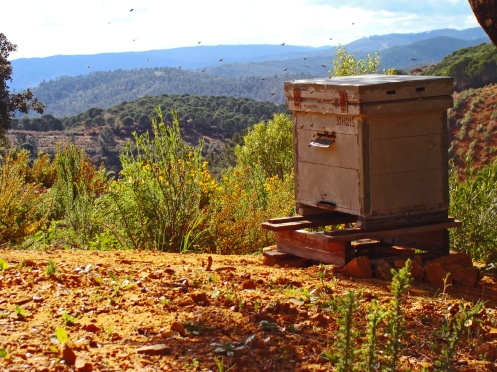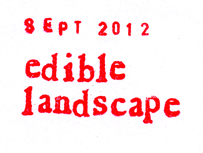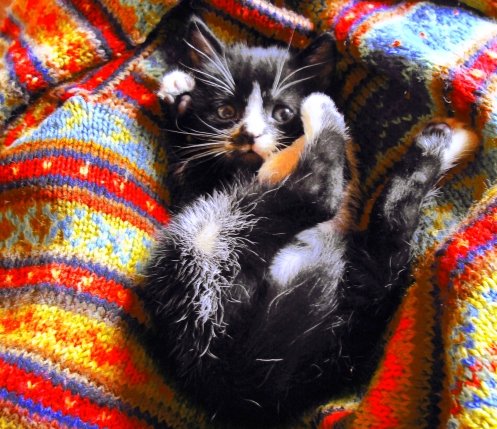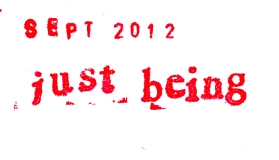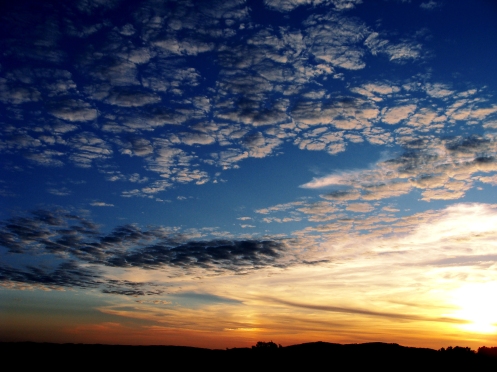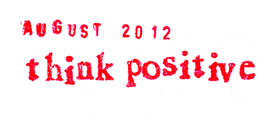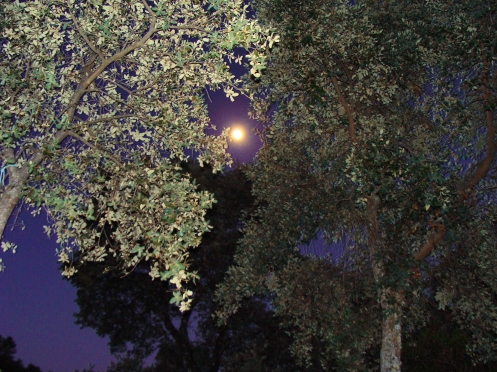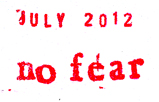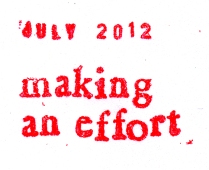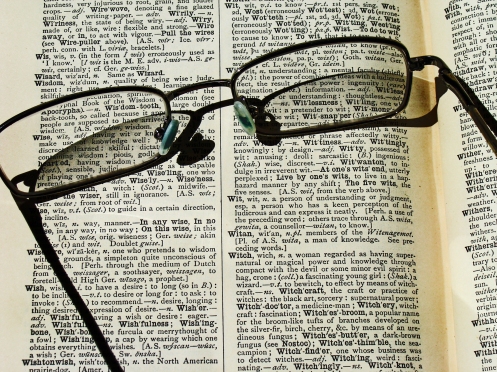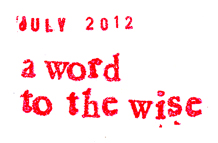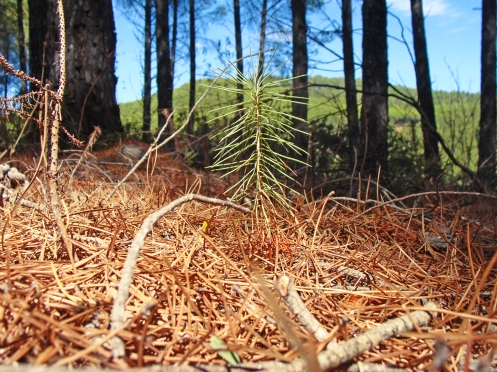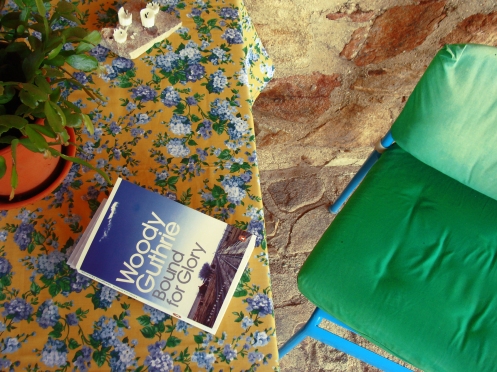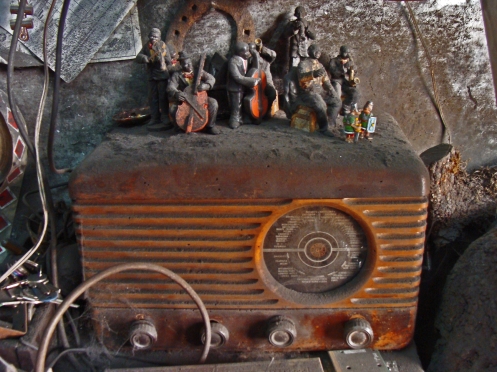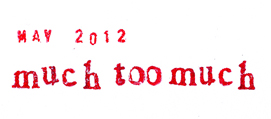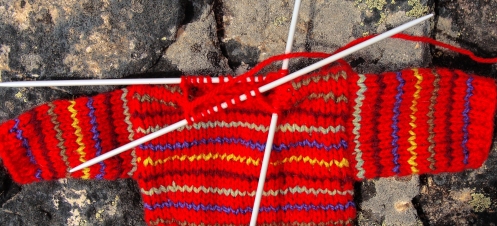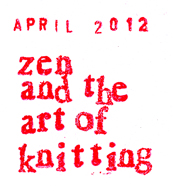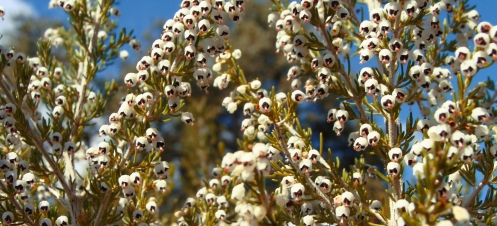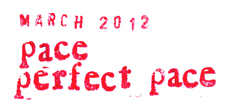It with great sadness I have to impart that Maureen has just died, last week, on Tuesday 29 October.
Maureen was and evermore will be Sofia, of MONKEY & SOFIA fame. Sofia being the magical kitten we rescued from the streets of Odemira in Portugal and who gave us so much love and affection during a very hard time while searching for our place. And just like Sofia, whoever meets Maureen is instantly touched and changed by that same magic.
She also weaved a similar spell on everything she did, having the unique ability to excel at anything, be it craft, skill, or learning a new language.
I met her at college in London in the 1970s, where we were both training to be art teachers. The first time I saw her she was hanging from the ceiling in the print room. I knew then I had to get to know this person. Two years later we were married, and since then lived together inseparably, for 34 years, until Tuesday 29th October 2013 when she tragically passed away at the ridiculously young age of 56. With so much left to give.
Neither of us became teachers, but Maureen did spend many years teaching art in other ways. Starting with the creation of a community darkroom in Wolverton, Milton Keynes. Devising the community arts events for the York Festival. Then spending 11 years as the Associate Director of the West Yorkshire Playhouse in Leeds, heading up the community and education department, which spawned many innovative projects (such as HEYDAYS), more often than not setting the standard for others to copy and aim for, throughout the world.
In 2000 we decided to give up a conventional life and head off to find a remote piece of countryside where we could learn to live more simply, healthily, and spend as much of each day as possible being creative. It took nine long years to find that place, during which we lived in a van, a tiny hamlet on a mountain top in Galicia (NW Spain), a derelict house in the Alentejo (Portugal), in a log cabin on the beach of an island in British Columbia, and finally here. MONKEY & SOFIA was born during that period, although we had been making and selling things for many years prior to leaving the UK.
I’ve lost count how many Monkeys & Sofias have gone out into the world since then, to become companions and heirlooms to both children and adults who appreciate their quality, it has to be in the thousands. All made by her nimble hands, along with all the other toys she invented. Each with a small part of her sewn or knitted into them. I know this because so many of those buyers have since become not only very good friends but part of our family.
Three years ago, just after we finished the house and moved in, she ripped her sternum carrying a sack of flour. That took a year to heal, and seriously knocked her back. After which she discovered a lump in her breast. This was a particularly scary moment as her mother had died from the same disease and that experience still haunted her. To such a degree she was adamant from the start not to have anything to do with the national health service. Luckily though we found a local homeopath who was able to treat her, and it seemed to be working. Then this summer it reappeared elsewhere, just as she was getting ready to start afresh, including taking up cycling again, and I think now in hindsight that must have used up any remaining reserves of fortitude and strength. It didn’t stop her from making things though, and she dispatched an order of gloves just ten days before she died. To me she seemed happy at that moment, and told me that the homeopath had said she would be completely recovered within two months. Whether this is true I have no idea. But soon after her health began to fail and in the end, against her wishes, I called an ambulance. It turned out the hospital couldn’t have been a more kind or caring place, instantly relieving her of any pain, after which she slept soundly for twelve hours then simply stopped breathing, having never recovered consciousness.
Another strange thing happened during the last days. Something I think very special and magical. From nowhere a man appeared to Maureen, come to talk with her about the spirit (her words). He came every day, sometimes with a friend and a child. I couldn’t see them, but they were often there at the same time. He was a painter, from Aracena (a nearby town), in his 60s, and she an artist who works with light (her words). Maureen had recently decided to learn to paint, something she had wanted to do since a child, and was planning this as the start of her new life having beaten the cancer. I am now convinced that these people were in fact angels, and that there is a much better life for us all in the hereafter.
For the moment I want to keep this site up, as a showcase for her work plus all the wise words of her blogs, although obviously there will be nothing available for sale (except copies of the knitting book). Eventually perhaps find a way to start the toys again, albeit new ones. If you would like to be kept in touch about that please sign up as a “follower”.
I would also like to thank all her friends and supporters, who over the years who have helped make our life the magic it was.
She has gone to a better place, bless her.
PS
Life without Maureen, so far, has been terrible. No-one talks about when this happens, and it has been so awful an experience (even compared to what I previously thought were some really nasty moments) that I am now seriously considering suicide as the best solution to the seemingly insurmountable problems suddenly dropped onto me. For despite all we have achieved in getting here it was all due to us both, working as a perfect team. I will be honest, I am not someone who can function at all alone. I need company, I need a creative soul-mate, or just revert to being an empty shell. This place also needs at least two people to make it work, 2.5 hectares is hard going. And an income, albeit small (just £3,500 a year), for which I possess absolutely no ability whatsoever to earn (especially here), Maureen having earned every penny of what we needed for the last 25 years (since I stopped work), while I took over the house-husband/ gardening role. I also have not accrued any right to state benefits or a pension. So if anyone out there has similar experiences/ advice they could share with me right now, which will be of positive help, I would really appreciate you getting in touch. I am in a state of utter shock. It feels like living in a thick fog, with no appetite, wanting to be sick all the time, totally drained of any energy, and so scared out of my mind every second that I fear for my sanity.
Phil Rooksby
Anyone who has read this blog before will know of my preponderance with being here. It’s obvious really, given the completely different environments we have lived in. Plus, there are few distractions, nature all around us and very little impact from anything else. However the experience of pondering does change. We’ve been here for four years now and our connection to the place is deepening, becoming richer. We are more aware of the feelings we get from being here and how the smallest changes attract our attention. I wonder if it is just familiarity with the place or something to do with what I starting to call brain detox. I was thinking about it the other day and marvelling at all the incredible experiences people have in their lives; the travelling, holidays, seeing new things, being able to buy strange and exotic foods, visiting art galleries full of amazing pictures, music, theatre, dance performances. It seems that nothing is impossible. But the weird thing is that whenever we meet people who have been and seen and experienced, they don’t have anything to say about it all. Like the experience was something to get through and a box ticked.
So my theory is that too many dazzling twinkling new things is like eating too much lovely creamy cake. Maybe it’s like gluttony, the more we have the more we want and unlike the first taste or experience it isn’t so wonderful. Things get taken for granted like someone visiting us was preparing to take a photo of the incredible orange sunsets we have here after sunny days. But having been distracted said it didn’t matter, it was just another photo of a sunset to add to the collection. Things aren’t so significant when a new shiny thing comes along every week. But something that gave me heart happened when I was in our little stationers a few weeks back. It’s run by a local man who is always in the shop and certainly not given to foreign travel. However on this occasion he had made his first foreign journey to Amsterdam at the invitation of his nephew who is working there. Telling me about his trip the man was lit up. He couldn’t believe what he had seen, how different it was, how beautiful, how life was so different. He seemed rocked to his foundations. We talked of how much more expensive life was there and I commented that it sounded as if the trip had been worthwhile and he looked at me, something shining from within, and said it had been much, much more valuable than he had ever imagined. I could see him looking around at all that was familiar with different eyes. That’s the kind of feeling I’ve had from visiting new places probably because we have been to that many and mostly we got to stay for a time. So what is this phenomenon that affects people? Too much too often? It reminds me of how things changed from when football matches used to be the special things about Saturdays. I’m no fan but I could appreciate people looking forward to the “match” their week focussed on that day. Now, football seems to take place every night. How can it have the same magic? The seeming appetite for stimulation every day must clog our senses or cause the deadening of our ability to experience new things and really enjoy them. Our minds are so full of images, like our stomachs full of too much sweet sticky junk food we just crave more but without being able to really understand why we want it or think we’ll enjoy it. What is the answer? No more holidays, no more chocolate cake? Well maybe yes that is the answer but perhaps more important is the question why these things appeal to us, why do we want an endless flicker of images or events, what does it mean for a society of people seemingly mindlessly booking holiday after holiday, to plod around looking at all the things they are supposed to look at and then miserably go home. It’s depressing. I’m half sure people only do it because it is expected. Everyone thinks holidays are what they are supposed to have, it’s normal. Less is more is what I think. There can be wonderful, memorable moments just looking at what is around us. Looking at what nature has made in just one spot is awesome and definitely more fulfilling than hours spent in airports shuffling around the world. Find a tree and give it a hug. Be happy live simple.
photograph by Nacho Suárez Obel – http://nachosfantasticphotographs.wordpress.com
Every month in Spain there is some sort of fiesta, some saint is celebrated, usually with late nights, music and drinking. Sometimes the saint is big enough to warrant a day off work, great news for everyone. In August it is the turn of San Lorenzo and his tears. This is a really nice fiesta because even though he doesn’t warrant a day off, the way of celebrating is kind of quiet and reflective, quite a change after all the rowdy fiestas. To see the tears of San Lorenzo aficionados have to identify a nice grassy slope in a rural spot away from light pollution and, for real comfort, people take a yoga or camping mat. Then from midnight on they lie and look at the sky and before long they are rewarded by the sight of shooting stars, the tears of San Lorenzo. Many people can spend until the early hours watching and enjoy quite a show. The actual date of San Lorenzo is 10th of August, but I think that at this time of year there are more shooting stars than in other months. I don’t know why this should be so, I wish I knew more about the sky and the stars but whenever I try to understand it I realise the limitations of my brain, try as I might information just doesn’t stick. But I reckon there must be something about the coming of the autumn or some movement in the constellations at this time of year because the first shooting star I ever saw was actually in August, in Edinburgh.
One of the many wonderful things about living here is the clearness of the sky at night time. The stars are incredible, there are so many that the sky is crowded and somehow the earth feels smaller and more just a part of the whole rather than being the biggest, most important part of the universe, as we think of it.
The effect darkness has on our place is impressive because it is such a contrast to the intensely bright light of day time, but the night sky changes the character of what we are coming to know during the day. On nights of the full moon, the shadows are intense, going for a walk is possible unlike on dark nights with no moon when it’s impossible to see more than a yard. The shadows cast by the moon make a whole new world, the texture of the shadows make it feel alive in a different way than we know. What we see around us during the day and what we are hoping to become part of is suddenly dramatically increased by the sort of parallel world offered by the moonlight. We are already overwhelmed by what we see during the day and now, San Lorenzo’s tears included, the sky and that’s up there, arch over us and help us understand that we are part of something much bigger than just our earth-bound selves.
As usual it’s not until long after I’ve read something or spent ages juggling seemingly random thoughts in my head that some sort of understanding starts to dawn. It’s no new phenomena for me, it’s been like this since Phil and I started out together years ago. We were full of ideas, things we felt passionate about and ambitions for how we wanted to live as well as whole list of things we definitely didn’t want. All these ideas and thoughts seemed such a jumble, it felt as if we never had a clear vision of where we were heading. But now looking back everything fits together, everything we did clearly led to the next thing, all the experiences added up, like our working for various organisations, moving from one place to another and now being here shows such a clear path that I’m amazed we felt that we were groping our way forward, trying to get things to make sense. But that’s the benefit of hindsight, everything makes sense looking back. There is a Spanish saying which is something to do with looking back along the road you’ve travelled and being able to see what it was you were heading towards. That makes sense to me.
I wonder now, with this sudden revelation about things which feel right leading us on to other things, even if we don’t know what those things are. Maybe now I’ve realised that the right path is somehow signposted in an obscure sort of way which is how we always make the right choices. I don’t really know, but I do get the feeling that there’s something out there making sure we do the right thing, anyhow, now I have some feeling that these things happen, maybe I’ll be a bit more clued up about things when they occur and be able to see why they seem to make sense.
Making sense for me can mean that some new experience I’ve had confirms something I’ve come to believe. And it’s so satisfying when it happens. I’m sure some sceptical folk would think that I’m clearly looking to justify my beliefs and rejecting those things which don’t fit although living here our scope is pretty narrow, but it is interesting how rich it is in content despite the narrowness.
So the thing I’ve realised recently, after reflecting on this bit of hillside and its trees and birds is that I have been missing something fundamental. All this time I have been getting glimpses of how amazing it is to be here and haven’t understood that to really understand it I should be using my senses; my eyes my ears, the sense of smell and touch rather than trying to draw this natural world into my own human one where we tend to over depend on our brains to understand things. Rhythm is as much part of this as anything else, as I’ve mentioned before. City dwelling confuses our senses with its bright lights, noise and ceaseless activity. Here, we are aware of things like night falling when we can actually see the sun setting and hear the birds flying home to roost which makes us aware that night time is for sleep, for us as well as the birds. When else do our bodies get the chance to do their repair work if we don’t sleep for a good stretch?
As Woody Allen said in Annie Hall, ‘nothing worth knowing can be understood by the mind’ and I think he’s right. We have all our other senses for a reason and that is to help us understand the real world.
Living here is about living inside nature, not looking at it from outside like a tourist views a place, but actually becoming a part of it all. This is so obvious now, as everyone knows, hindsight is a wonderful thing! Plainly, being here, being aware of the smells, the sounds, the heat, the cold, is drawing us into the world around us, the real world.
I wouldn’t have said that I was any kind of bird lover but have noticed that they do seem to crop up a fair amount in these blogs, maybe they have become secretly or subconsciously significant to me. Plainly it has to do with living here because there are only us and the birds. It’s true there are other creatures around here, like wild boar and deer, mongoose and genets, some of which we occasionally see, mostly the deer but not the others so much. They all seem to roam on to our land and then roam on, I don’t know where they live but people say they move along the valley bottom and live there only coming up to find food when there’s none down there. The birds though are different. I have started to think that some of them live here, that these are their trees and they fly around this patch and roost in the pines or wherever at night time. It’s really lovely of a summer evening to be outside at twilight and hear them settling down, calling to each other and sounding different from how they do the rest of the day. It might be just my feeling but the birds seem to have a pattern to their days and maybe even their year. Definitely some of them are more in evidence at particular times of the year than others, although the idea of birds having some sort of routine might just be me trying to make some sense or order out of the lives of the wild creatures. But the array of tiny birds, some of which nested in our boxes, and were around earlier in the spring and very vociferous about their comings and goings, then just disappeared overnight, the parent birds, the babies, and all the others, we noticed then how quiet it had become around the porch where all that noise had been. I imagine they knew the horrible heat was about to arrive so took themselves off to some cooler spot, maybe in another country even.
The birds which are still here are down below us in the shade of the valley and in the tops of the trees down there. We can still hear them but they are quieter and distant, apart from at dawn or twilight. Our rural silence of early morning is interrupted by just one or two birds calling to each other, then gradually other birds join in and the dawn is filled with birdsong. It’s really something to be able to listen from our bed when the fly screens cover the open windows, hearing the intimate calls in the semi darkness. It is beautiful. It’s like the reverse of listening to them in the evening when they are settling down in their roosts.
During the heat of summer days, at siesta time in the afternoon, the birds are silent. They too are finding the heat too much. It’s interesting that our patterns overlap as they seem to. Us and the birds, enjoying the cool mornings and the closing down for the afternoons, maybe it’s a comfort to know we share habits as well as habitat. Are we becoming more like the birds, I wonder? Maybe we are, they certainly seem to have the whole thing in hand, life that is. While their supreme ease at living make our attempts seem lumpen with effort and intent. I think that their relationship to the place is always going to be richer than ours, because they occupy somewhere we can’t. We are earth-bound and they are able to fly, to see everywhere we can’t, and feel the wind in their feathers.
It’s early evening now on the first of the really hot days of summer and the bee eaters are coming up from the river, warbling their special song and wheeling as fast as swallows. We can see flashes of their bright blue and orange feathers catching the sun as it sinks to a more acceptable and less intense place in the sky. I love it, sharing our life here with the birds, I just wish I didn’t feel impelled to make sense of everything, to try and understand why the birds do as they do. I never seem to learn that it’s fine not to have all the answers and that I’d be putting my brain to better use just trying to enjoy the birds for what they are and what they bring to our lives.
If you’ve never read The Man Who Planted Trees by Jean Giono you’ve missed a treat. It’s a lovely tale of nature and hope and, in the best tradition of storytelling, one which everyone who reads it, feels could be real and even that it should be.
I was thinking about it the other day when I’d started wondering about the first trees and where they came from. The land around us, although geographically high, wild and rocky, is covered with what we call plantations; trees planted by someone at some stage for financial gain. There are lots of pine trees planted by the local authority years ago as income for their budget and there is a type of oak whose acorns are the traditional feed for pigs. There are cork trees which every nine years have the first 10 feet of their bark removed and sold to the cork industry. And there are chestnut trees which were grown for their valuable crop of nuts. So where are all the naturally occurring trees which are just themselves and don’t produce something humans need? The oak trees do spread pretty easily, the acorns settle into the soil if they aren’t eaten by pigs and grow quickly so maybe they outpaced other trees. They are good survivors because they manage to survive the summer’s scorching temperatures without needing water so they do well in this morbid dry environment. Our bit of hillside had its share of these trees but there are also areas where tangles of wild fruit trees and brambles survive. During the dry summer these shady, green patches look luxuriant. The mixture of trees and plants protect the soil from drying out while obviously, somewhere down below the soil, there is water and the trees have sent their roots reaching down to bring it up to the surface. It’s lovely to see the interdependence of the trees and plants providing a habitat for insects and other creatures, the atmosphere in this tangle of greenness is so different from the bone-dry hills around us with their sad ranks of uniform trees and nothing else.
I’ve asked local people about what was here before these trees but no one can tell us anything apart from what they’ve read in tourist brochures about the wonderful oak tree which has proliferated here for ages and provided well for ancient people who could grind the acorns to make flour and roast them to produce a type of coffee drink. But surely, there must have been other trees, forests even. Maybe there were these oaks but there must have been something else as well and anyway, where did those oaks come from? Which beggars my question about what came first: the trees or the acorns?
There are people like us who can see that nature would never have supported monoculture. Nature is natural and naturally occurring seeds are in the air or brought by birds or animals and when the time’s right they germinate. Some people think that all plants and trees originate somewhere, that they are indigenous to a particular place, somewhere that some wise person has decreed that they came from, and that introducing strange seeds and plants into an area where they don’t currently exist is wrong. But who is to say at this point in time, where plants and trees belong or originated? After all, apple trees seem to have originated in the Balkans but do excellently well in Britain. No one seems to have thought it wrong at some point in history to introduce them to a different country. Apple trees are part of life all over Britain. However, people can remember nothing other than what’s in their area now. The collective memory seems to fail after two generations so who is ever to know about the old forests or wild woods which must have been here in Spain before?
I remember having read in Ronald Wright’s A Short History of Progress, which I have mentioned before, something about deforestation:
‘The first farming village in the world appeared in the uplands of the Fertile Crescent or the Middle East, and that mankind drove itself from this Eden in the sixth millennium BC by denuding the land. Thousands of years later, the sad story was replayed in the Mediterranean basin, especially in the hilly terrain once thickly covered by old growth forests, an ecosystem of which hardly a trace survives today. Once again, the principle villains across Greece, southern Italy, southern France and Spain were fires, goats and timber felling. A herd of goats is not only meat and milk but capitol on the hoof, hoarded in good times and sold or eaten when necessary. Able to thrive anywhere goats often create an environment in which little but goats will survive.’
This is what happens to the land when it is used and abused for profit. It seems sad to me that people here really believe that rows and rows of pine trees or hillsides full of oak trees is a natural environment. Should we listen to the purists who say we should wait for governments to come to their senses and change things with big programmes of cash incentives for landowners so that once again real nature is obliterated? I don’t think we can, although many people will ask what impact two people can hope to make by on a tiny wild bit of hillside in amidst all of this? Well, doing something rather than nothing is at least showing another way, and thinking back to the inspiring book The Man Who Planted Trees, a little can go a very long way.
illustration by Harry Brockway, taken from The Man Who Planted Trees by Jean Giono
I’ve been thinking about ‘stuff’ this last week, stuff like things, possessions, things we own and fill our homes with. I don’t know if this has to do with watching the little birds in the trees making their nests in the bird boxes but maybe it does. The birds are so busy and single minded in their work, coming and going, popping in and out of their houses in some well worked-out relay. I have no idea how it all happens between the birds but there seem to be pairs who decide on a particular bird box, in one case I wondered if they were the same couple who were here last year because that one of the boxes was inhabited while the others weren’t. Anyway, they start work on their nests and I wondered if those who found an old nest in their chosen box, which just needed a bit of attention, were happier than those who had to start one from scratch. I’m not sure because one couple spent all afternoon removing stuff from their newly acquired box so I can only imagine it was dirty or maybe badly made or from the wrong stuff. Or perhaps the process of building the nest is a fundamental part of the preparation of laying and hatching eggs. Anyhow, the perfection and simplicity of their efforts puts us to shame with all our excesses in nest building and all its social and cultural connotations. Surely all anyone requires is a shelter that will protect us from the elements and which we can keep warm by basic means. Birds must have some superior insulation in their feathers and their little scaly feet maybe don’t feel the cold but, even with a blazing fire, our nests are so out of scale with the necessary.
When we sold up and left our old home we sold virtually all our possessions too. This was partly because we wanted to feel the lightness of not owning things but also, since we were going to be living in a van there wasn’t any space for more than the essentials. Initially it did feel liberating to know that everything we owned was in that van with us, but as time passed and the only door key we possessed was for the van we began to feel as if we had lost who we were. It was a difficult and scary time, not being able to find where we wanted to be in order to settle again, so part of our unhappiness was due to that but it was frightening not to belong anywhere, not to have somewhere we could to go back to where we had friends who knew us. People had said that we were brave when they heard of our plans but we didn’t understand what they meant or why they would think it. For us, bravery hadn’t come into it, not at that stage anyway. It was much later after a lot more experiences that I came to realise that the bravery friends spoke of was about our daring to abandon our carefully constructed life and the determination we had in trying to make a new one.
As time passes and our years begin to add up I get the feeling that our nests become lined with the experiences and values which we continue to gather until a certain time in life and then there are no more new ones to add. We are happy with what kind of person we turned out to be and without knowing it we set about ensuring that nothing new comes along to challenge our perception or to make us understand that life still has to be lived, right up until we die. We have our values, beliefs, experiences and houses full of stuff which reinforce for us who we are. Actually it was this defining which made us feel as though we were suffocating, that we were being shaped by our past and it was weighing us down. The painful, in our case, process of shedding was not something we planned, as with so much of our journey we groped our way along and tried to understand what felt right or didn’t. In hindsight what we were trying to do seems so obvious but we felt we were blindly responding to our emotions, apparently it always turns out easier to see the patterns and to understand things in retrospect.
Now we have our simply appointed hut and are very happy, even though the list of things it doesn’t have far exceeds the list of things which it has. We have learned to keep life alive, to expect to be amazed everyday by where we are and the things we see and experience and to know that not having the answers to everything is perfectly acceptable.
Our nests should be places which shelter us and keep us safe. They shouldn’t be places which we turn into a fortress of values and certainties which we then have to protect.
This fortress idea came to me as I’m re reading Austerlitz by WG Sebald in which there is mention of the building of fortifications….really fascinating:
…….it had been forgotten that the largest fortifications will attract the largest enemy forces and that the more you entrench yourself the more you must remain on the defensive……..
We may not be defending our homes against invaders but when ideas or theories new to us come our way we shouldn’t automatically feel the need to leap to defend our old, dearly held views. Maybe sometimes there’ll be a new perspective for us to consider and then to accommodate amongst our constantly and healthily shifting values which can be really exciting. Anyway, our nests should be all we need to keep us cosy and not stuffed with things we don’t need. Happily even the smallest nests have room for new thoughts.
Living here, in a foreign country we have realised that it’s necessary to ‘imbibe’ what’s going on around us in a way that wasn’t needed in our own culture. Language is of course part of the difference but it’s not just words, if it were then steadily learning grammar and vocabulary would be enough, but we have found that it isn’t. Usage for one thing illustrated that we use lots of phrases in daily life and never think how weird those things might sound when translating them word for word into another language. And of course, foreign languages too have their own strange turns of phrase. For example, we might say was are looking forward to seeing someone, where as people here say they are ‘ilusionado’ about seeing someone, which looks like it might have something to do with illusion but in this case obviously doesn’t. For us it’s like living in a word puzzle, requiring lots of concentration and which can be very satisfying when you discover something new and feel you’ve gained a bit of knowledge or, that finally you have understood something. But there’s the other stuff, life lived differently, cultural points of reference which refer to things we know nothing about. Like the last however many years of politicians, public figures, musicians, footballers, TV presenters, artists, authors etc, well known people who have contributed actions or events which form a backdrop to everyday life. We are at sea without a compass with regard to these types of thing.
Learning to understand a foreign culture and its language is tremendous exercise for the brain; we are constantly looking for clues or meanings from the people we encounter. Moods, kindness, irritation, shyness or friendliness it can be very tiring and we’re aware of grappling with tiny bits of information and trying to make sense of them. Over time I think we have developed a kind of telescoping technique of zooming in and out while speaking to people, checking for extraneous information while trying to work out which of the things we are hearing are useful or not so important.
In a way, despite all our gathered experience and expanding vocabulary I get the feeling that we will always be slightly out of step here even with our friends but then, we definitely felt the same way with many people in our own country. Having certain principles or passions can set you apart so it’s not really so different being here. Words are one thing, but I think the world’s obsession with language, both spoken and written and the endless chattering and noise all around us can make it difficult for us to really hear what is important, even in our own tongue. Spoken words have their limitations and their potency has been reduced from overuse.
In a way, language has been given too much value, there must be lots of other ways that we can communicate but have lost the ability over time. There is a wonderful example of this in the work of Reggio Emilia in Italy and it’s thrilling to see examples of the creativity and inspired work which happens there every day. Reggio Emilia is the name of a school for young children in Italy which was set up after the war by Loris Malaguzzi and a group of parents from a desire to:
‘ …..bring about change and create a new, more just world, free from oppression…………urging women and men to gather the strength and build with their own hands, schools for their young children’.
Learning in Reggio Emilia centres on the children’s exploration of their world using creativity as their only tool. They are assisted and enabled in their work by their teachers and parents. One of the interesting central themes of Reggio Emilia is its acceptance of the ‘hundred languages of children’. This is a reference to the incredibly diverse ways young children have in communicating before they acquire a full spoken language. Visit the site and be inspired.
Anyway, thinking of all this stuff about communication, language, both forgotten and acquired, I have begun wondering about nature and how we can understand it. Maybe in the far distant past we were more connected and were part of the whole environment so could pick up nuances, rhythms and understand their significance. I’m conscious of letting go of all the complex ways I acquired in communicating and understanding in all those years of work, not just because of the need to create more space in my head but because those skills just doesn’t mean that much here, it’s like a foreign currency, it doesn’t have any value. Obviously foreign culture and language are things we are growing to understand, however, we are realising that nature’s way of communicating is going to be fascinating to experience and understand.
Over this last week there has been a dramatic change in the weather, literally days ago we had the stove alight and each time we left home we were wrapped in jumpers, jackets and waterproofs to try and keep dry in the endless rain. Today its 30 degrees, the sun is burningly bright and we have been watering the young trees in pots outside the house. What can it mean? Each morning we are treated to an ensemble chorus of every kind of bird as they enjoy the spring and start nesting. While sitting in our porch a pair of swifts flew back and forth only a foot above our heads, looking for a suitable bit of roof to start building. We felt honoured by their visit because we’ve never seen swifts around here; they usually stick to the old buildings in the pueblo. I wonder why this should be. Is there something we could understand if we had the ability? The thing is, maybe we don’t understand what is going on around us but it’s fascinating to think that eventually we might and we feel that it’s really worth the effort of giving ourselves over to trying. We have become accustomed to the sensation that our brains are being exercised in a way which they definitely wouldn’t have been if we hadn’t set out on our journey so maybe, eventually, we will understand more about nature and even discover a way to understand it at a deeper and fundamentally different way than merely thinking about it in words. I seriously think that the preschool children at Reggio Emilia have something to teach us.
After three weeks of end to end heavy rain everyone here has been called upon to dig deep and draw on their own personal resolve to survive the onslaught. As I’ve mentioned, there’s no weather in these parts which can be taken lightly, even rain is extreme. Last Sunday there was a full twenty four hours of heavy rain, enlivened by a cracking thunder and hail storm in the middle of the night. Even the hardiest of souls were wringing their hands and looking worried as streams of water coursed down the hillsides and gushed along the roadside gullies under leaden skies. It’s small wonder, when confronted by a drenching just getting for the door of the house to the car, almost everyone opts to stay indoors, stoke up the fire and think of all those outdoor jobs waiting to be done. I think it might be called enforced slowing down. Even the teams of men who come to the hillside in the local authority Landrovers to brush cut the firebreaks sit hunched behind steamed up windows unable to get outside.
In a way it can be a pleasure for us to be forced indoors, to be able to think of things other than practical matters and enjoy the luxury of living slowly. Time to think, read books and write letters. Obviously, giving into severe weather conditions wouldn’t have been an option if we weren’t here on our hillside but beavering away in the city as we used to, protected from the elements in warm, bright offices. Being here, indoors behind our rain-streaked windows with clouds scooting past, I wondered if it would be possible for us to reconnect with that world, would it be too alien now. I know that when we set out I used to worry about becoming so disconnected, that it would be impossible for me to retrace my steps back to our old life and I feel as if I left a mental trail of breadcrumbs back to the city. I haven’t thought about that in ages, maybe its rainy days like these, when life seems to pause, which give random thoughts a chance to surface. I can remember well trying to keep one foot in that other place, not actually disconnecting so that no break actually happened because, like everyone else, I wanted to think that any door, even one into the past, wasn’t closed to me.
But recently, and only recently, I’ve realised that decisions about life have to be made. Choices, one thing or another, and amazingly it’s taken me my whole life until now, to realise that it’s acceptable not to do something, to say no. With this discovery came to realisation that I was free to set out my stall with all the things, values, ideas which what mattered to me, it’s just so strange that it should take me so long.
It was while I was still feeling the newness of this discovery that I saw a leaflet from a cultural organisation in London about a special weekend of activities with a programme of performances, discussions and events. And apart from the excessively energetic language: ‘ground-breaking’ ‘thought provoking’ ‘award-winning’ ‘critically acclaimed’ ‘compelling’ ‘powerful’, or maybe it was because the whole thing seemed so unnecessarily breathless and alien that it felt weird, and sort of bobbed along next to my revelation about saying no to things. Maybe the reason it had been impossible for me to decide on my own personal values was because I had been surrounded by all this ‘noise’ which acted as an invasive interruption.
Perhaps because city life is so distant from nature’s quiet soothing rhythms it makes its own beat which sounds strident, bullying, insistent and hard to ignore. It’s hard to imagine but who would have known that revelations about personal values and clarity on life’s important things could have settled around me now in the same way that the sunlight appears here after the intense greyness of the endless rain. All very odd, but there we are, it seems we can understand or discover important things without all the drama and drum banging noisiness of living in the city.
Here we are in March already, pulling ourselves out of a long, cold and wet winter, intent on looking forward to sunnier times. Actually, I’ve been trying to work out if this is winter really has been longer or whether it just feels that way, maybe it’s the excess of cold, wet weeks that have made this winter seem so interminable. Isn’t it strange how time can feel so elastic, telescoping back and forth in our memories making us think that some event was only yesterday when it was actually months ago and conversely, things which have just happened seem to slip quickly into the past. Maybe that has more to do with how we feel about particular events rather than real time.
Actually, the only thing which ticks along in a fairly regular and even pattern is the passage of the days; they mostly do feel the same length. This probably means that our minds can just about deal with twenty four hours, more than that and our grip becomes less firm and our feelings more hazy.
I sometimes wonder about our perceptions of things, like how long things really take, time actually passing, distance between events and the changing seasons. Those things are all in sharp focus here, even if we have difficulty keeping tabs on them or being aware of what is happening. At this time of year we are willing the lovely days of spring to arrive, wondering how long it’ll be before we feel the warm sun on our chilly skin, when if we could just take notice of the bigger picture, of all that nature around us, we’d be able to see that it was already happening. March is incredibly different from December or even February when everything appeared to have stopped. We hardly ever heard the birds singing, we were enshrouded in a muffled grey light, the hills covered in mist, soundless apart from when we were visited by heavy rain or the roaring wind rattling the roof tiles. But now the light has changed, the trees are full of noisy birds and everything is coming back to life so quickly. There are lots of wild plants here and they have burst into flower just in this last week, there’s colour everywhere. Many plants are like the gorse and broom, bright, perfect yellow and the leggy heather so pink that the opposite side of the valley, which is usually brown, looks as if it has been sprayed with a soft haze of pinkness.
The track from our little hut down to the pueblo takes us through high pine trees, big rocks and boulders which are now surrounded by sprays of bright yellow and pink, everything so alive, fresh and vibrant. Those plants have been there all winter, dressed in their dull winter clothes, blending in with the damp grey background, now they’re covered in flowers. It’s the same thing as time, one moment things are happening and the next they are slipping into the past, retreating into obscurity. But isn’t it amazing that nature produced these cycles, dark, brooding, unproductive times followed by the big burst of colour and transient beauty. Actually I shouldn’t think of it as amazing because it’s the plants which have the real rhythm, it’s what nature does all year through and it’s what we have so much difficulty grasping. I wonder if it’s to do with perspective, our vision has got so close or short, I’m not sure which but we spend more and more time looking at things near to us, right in front of our noses, like computer screens, television and the ever present mobile phone, that to stretch our eyes away from the immediate is almost alien.
Our little place is hunkered down on a steep hillside. Pine trees and rock loom behind us and the land slips away in front down into a deep valley. It’s so steep it’s not possible to get down to the bottom, there’s water there, we can hear it foaming for days after a big rain storm but we’ve never actually seen it. We’ve plenty of windows to look out of and can see for miles, right across the valley to the mirror steep slope on the other side where we are level with the top of the burnished, pink heather hills. On clear days we can see to the horizon some sixty kilometres away. We are accustomed to our crow’s nest view, sky all around, but it’s still possible to be surprised. Out on our little porch, which protects us from the strongest elements of the weather, I could hear the griffon vultures circling and naturally looked out from under the porch and up at the sky. When I couldn’t see them it took me a moment to realise that my perspective was wrong, I was looking up when I should have been looking down. Down to the trees below where the birds were flying, it appears that sometimes we are above the birds. The trees down there look so miniature but really they’re huge oaks. Down there is where the sky starts and the tree tops sway. Our difficulty is in understanding what we’re looking at because we are so high up and trees are usually something you stand underneath.
In the same view we heard a rumbling noise and after adjusting our eyes, could just make out a little yellow shape appearing and disappearing under the trees right at the bottom but couldn’t work out what it was. A person? Some sort of bird? Eventually we realised if it had been either one, we couldn’t have seen them because they’d have been too small. Having dusted off the old binoculars we squinted down and saw a tiny yellow tractor moving backwards and forwards in the lens, ploughing the ground under the trees. Even though we were seeing and understanding what it obviously was, it took some time for our minds to accept it because the thing was so, so small when we knew those tractors where huge. Literally, we couldn’t believe our eyes.
But it was a very useful thing because now I often think of the yellow tractor when I’m trying to understand how nature works or how long or far something seems. It’s easy to be looking through the wrong end of the telescope and not getting a real perspective.
The month of February is apparently the lowest point in the year. We are almost out of the push which saw us through December and up to Christmas with its tinsel and lights. Their afterglow and all the celebrations managed to take us to the end of January, even though it was cold and grey we had the feeling that if only we could last out until the end of the month, spring would be there for us in February. But unlike TS Elliot, who thought that April was the cruellest month, I reckon that honour goes to February. Granted, April pretends to have something warm and friendly to offer us, with glimpses of the summer to come but then cruelly dashes our hopes with late snow and bleak coldness. At least February doesn’t pretend. It is the low point.
More people die in February than in any other month of the year. I don’t know if that’s statistically correct but my Mum told me it was true so surely that makes it fact. Years ago she worked at a dry cleaners in a parade of shops opposite the local crematorium. Her boss, having had the advantage of seeing many Februaries pass, observed that this was the month when the crematorium was at its busiest, it was the low point in the year where those hanging on by a thread just couldn’t cling on any more. I wonder if that’s really true or if there’s something related to the universe, to do with the magnetic pull of the earth or the planet’s atmosphere or a shift in the earth’s axis. In other words, something bigger than us which occurs in February and takes some of us with it in its wake. Perhaps it’s more acceptable to believe in the big thing rather than it just being the endless cold greyness which adds depression to physical illness and ultimately equals death. I don’t know.
I’ve been thinking about it because our friend died, the one who was in hospital, and it just seems wrong. I know people will say that 83 was a good age and that death comes to us all but my question is, why does it? Why does it come? I’m not sure if I mean the actual dying itself, which seems so utterly sad and awful or why, when however old we are, we can never really be ready to go. Certainly all those left behind aren’t ready to be alone. It’s just not right. The more I think about it, the more I am left with the feeling that for all our so-called advancement we still don’t understand the simplest thing i.e., why do we have to die and why are we so unprepared for our own and our dearest’s departures? We cloud the issue by focussing more and more on inanities and things which waste life so appallingly, like chatting online. Is there anything more disrespectful to our short lives than chatting? Meanwhile, if all the clever people are busy inventing things like Facebook who can we look to, to help us understand our end? Maybe society’s worship of youth culture is the acknowledgment that there is no answer and that our obsession with being young is us trying to back away from our inevitable end.
An Indian friend once said that he couldn’t understand why Western cultures were so worried and fearful about dying, never wanting to think or talk about it, let alone embrace it. In his culture life and death were much more closely tied together. Everyone understood that death was part of life, not some bogeyman waiting to snatch us away, death was the next stage, it happened in the context of everyday life and was somehow more acceptable.
Maybe it’s just that unreal sense of people being rubbed out of our lives, the sudden disappearance which seems so wrong. Would I feel less sad about Tim’s being missing from our lives if I knew that he was prepared to go and that his family were not so distraught? I don’t know but it seems wrong that he’s no longer here.
When someone is missing from the daily roll call of life their disappearance affects everyone who knew them. So surely that means that our lives are really about us belonging to other people and to our place. In a way it’s one of the things we feel keenly here, because we are foreigners living in a tiny rural community. We’ve no family here and didn’t know a soul when we arrived but somehow we have managed to edge our way into this place. Unlike the big city we came from this place is almost entirely made up of inter-related people. Cousins, aunts, brother-in-laws, nephews, godmothers, great aunts and how strange it must have been for these people who, not only have known each other since birth, but in many cases have connections going back through generations, to have to work out how we fitted into the pattern of the place. Bizarrely it seems to be happening, not due to any huge effort on our part beyond being grateful for local people’s acceptance and respectful of their way of life. Gradually over almost four years we have become ‘familiar’, family, a term for those who belong here, a greeting when we meet each other in the nearby small town. People miss us if we fail to materialise when we are expected in the pueblo, they report that we had been asked after and are happy to know we are well and back on track, i.e. visible. People are ready to offer what might be needed in the way of help or at least solidarity whenever we have a problem. Maybe it’s always been this way in small places. Help had to be found amongst its people because there was no one else to ask.
Yet, deaths do affect everyone here too. There was a funeral yesterday because even in Spain, February claims its own. The crowd of black-clad people were huddled outside the church, sharing their loss and again I felt it was wrong. But there was a difference and I think it might have something to do with small places and small communities. Everyone who lives here knew the woman who died and likely, they’ll have a memory or two of their relationship. So maybe this makes if feel that even though she’s no longer here her part in the fabric of life won’t fall into holes because of her absence. Everyone’s memories will ensure that. And after many years her part will have been reworked and embroidered over by the people who continue to live here so that the fabric will continue to hold her and everyone else in it.
I’m going to ponder this fabric thing as I continue to miss Tim’s regular, weekly letters. Love, death, memory and place are surely something for us all to think about, but thankfully February is behind us and we can look forward to a hopeful March and the joys of the spring to come.
I’ve just read two really fantastic books back to back: The Night Circus by Erin Morgenstern and The Time Traveller’s Wife by Audrey Niffenegger, and all the while I was reading them and popping back into real life I felt as if I was looking at the world while standing on my head or through the distorted glass in the bottom of a bottle. Are things really as they seem? Or do our minds have the capacity to make order out of a jumble of images just to make things comfortable? In creative and marvellous stories where odd events happen, the characters quickly adapt to the strangeness and accept things, obviously because if they didn’t the story wouldn’t work, but I have a feeling that if something odd happened in our everyday lives we too would just as quickly accept it and in no time it would cease to be strange.
Not long ago we watched a lovely film called Another Earth, where one day a seemingly identical planet earth appeared far away in the sky. At first people were concerned, although not hysterically so and then gradually, over the years it took for the other planet to come closer, they became accustomed to it and mostly decide to carry on with their lives. But then, what else would they do? Go crazy? Jump off tall buildings? I know that this too was a story but I do think that our ability to adapt to strangeness seems to indicate that there is something inside us, ready to accept almost any change in our environment and that thing helps us shift our perception of how things are. After all, those Apollo trips of the 1970’s suddenly changed our understanding of the moon and we accepted that.
There’s something liberating in this idea which appeals to me. It makes me think that if one day, the planet decides to shift and make dramatic changes then we’ll just assimilate the change and learn to live with it, provided that’s possible. The wonderful part is imagining the incredible.
I think people should be encouraged to think the impossible because currently most people prefer to function using only so called, hard facts. Immutable truths, accepted values, shared knowledge and very few people spend time wondering what life would be like if things were ‘other’. I’m sure this obsession with so called facts is a symptom of our society’s state of being, its obsession with news, documentaries and the internet, maybe people think that there’s nothing left to wonder about, the answers are all out there. Definitely people are more drawn to stories which are based on ‘true life experiences’ than fiction. But isn’t that a shame, when there are so many wonderful books about the strange and magical. What will happen to our imaginations? Will they start to stagnate from lack of exercise, so that eventually even another planet earth turning up will be accepted, once it has been sanitised by television crews?
Where does that leave fantastic stories like The Time Travellers Wife and The Night Circus? Trapped in a bubble of make-believe or whimsy? Or can they really help us understand who we are and our sense of place from a different perspective? Actually, I find it hard to accept that stories as well made as these don’t have a resonance with our world. Could the authors have written those stories without believing that there are things going on which we might not understand? After all, the planet exists, we exist, animals, plants, trees, the sky, the sun, wouldn’t those things be incredible, fantastic and hard to believe if we hadn’t already accepted them? Surely it stands to reason that there are many more marvellous things out there. Why not? It’s just that our perceptions aren’t up to the job of seeing that they’re there, not helped by our current obsession with facts and figures, true life stories, tangible television-worthy material. Our other senses are shrivelling like our imaginations from lack of exercise.
The other thing I wondered about while stretching my mind around these beautiful stories was, what is actually going on inside people in today’s world if all the things which occupy our thinking are so external, like obsessing over the next electrical gadget or fashion accessory and absorbing superficial information. What is happening to our hearts and our souls? What feeds those important parts of us, what keeps them alive, warm and loving? It has to be something intangible and impossible to quantify but how do those obsessed with measurable things know what that is?
This week I realised what that intangible is for those who have shared a long life with someone else. A friend in his eighties is ill in hospital and the only thing his wife and family are hoping for is that he will be restored to them. They know well the rituals which make a real life, the shared morning coffee, the pleasure of the garden they have made together and the joy their little dog brings. These simple, meaningful things have been made by people who know love. The only thing which breathes life into hearts and souls is the sharing of a life with another person, someone whose own heart and soul is nourished and maintained by our care and attention. The intangible, immeasurable, elusive, unquantifiable thing we all search for, which doesn’t conform to scientific measurement or any sort of easily supplied internet answer. So maybe the world isn’t as lost as it might seem because all the while we value, above all other things the intangible wonderfulness of finding love and living true to its meaning there’s still hope.
Christmas, New Year, then Los Reyes Magos – the Spanish celebration of exchanging gifts. It’s been a long break. So long in fact that it’s actually hard to remember what our life was like before all the usual day-to-day activities were suspended. Holidays or, as they are known here, fiestas are eagerly anticipated. And that’s not because they are rare events, one glance at the calendar will reveal a holiday almost every month, but I am beginning to understand that there is something very important here about these breaks. Quite apart from the relaxation of having a day or more off, it seems that local people actually feel more like themselves when they aren’t at work. Here the business of living is valued, just being with family and friends needs no explanation this is the way life should be lived. Going to work is a necessary evil but not one which anyone spends much time indulging. As for ambition, it’s not really something I’ve come across here at all. Maybe it’s a symptom of living in our tiny, rural corner. Just looking at the map of Spain shows us literally clinging on to the bottom left hand corner, geographically disconnected from the rest of the country. Maybe there are people in faraway cities ambitiously planning their futures, hoping to be someone different by the time the next New Year comes along, perhaps even knowing where they want to be in five years time. But here, we celebrated the arrival of 2013 with new friends at a party in the pueblo. The clock struck midnight and, as is the tradition, everyone ate one grape for each chime to ensure a year of good luck. Earlier in the evening we had all written our New Year wishes on pieces of paper and then folded them up to stay secret until next New Year’s Eve when we will see how many of our wishes came true. Rather nice to have wishes I thought, as if how things turn out is divined by a power other than ourselves, very different from making New Year’s resolutions; all those promises to try harder, be better, improve ourselves, set new goals. New Year wishes are left to resolve themselves, hopefully in our favour.
Maybe the difference between English and Spanish New Year hopes has something to do with what we perceive as our purpose. What are we here for? Are we supposed to be striving for something or does that notion come from an external force? Who knows? I can understand hopes and wishes though, after all, we wouldn’t be human if we didn’t hanker after something, but are we just here to have or acquire things or could our wishes be about how to actually feel things better? Could we, for example, aspire to improve our senses?
I was wondering about all this the other day as I watched a flock of vultures floating in the sky. They were really high up, lifting and dropping, turning and rising on air currents. It was a warm, bright day, the sky as blue as it is possible to be, an unreal children’s sky colour and I thought about the birds. I know that they come from a special bird reserve about 25 kilometres away where in recent years they have been reintroduced. But why did those birds come to our bit of sky on that day? Was it the first bit of hillside they came across after the flat pains where they live? Have they decided to nest here? Is there more food? Who knows? We can hardly understand our own actions let alone the motives of other creatures. Maybe that’s what makes their behaviour so attractive, as if the decisions which wild creatures make are so pure and impulsive. No agonising or planning and with no obvious outcomes. Watching the birds as they were gliding I felt as if they’d got it right. They were just being purely in that moment, right then. Not storing up their wishes for next year. Us humans always need a whole fabric of planning, wanting, waiting, aspiring. I guess that’s all in response to the complex lives we lead, even when we’re trying to keep it simple sometimes it’s just not that easy.
But now I’ve had my revelation watching the birds, I’m going to try and keep them in my mind’s eye. Something to reflect on when I’m feeling cornered and maybe that image will help bring things back to the real, simple business of living.
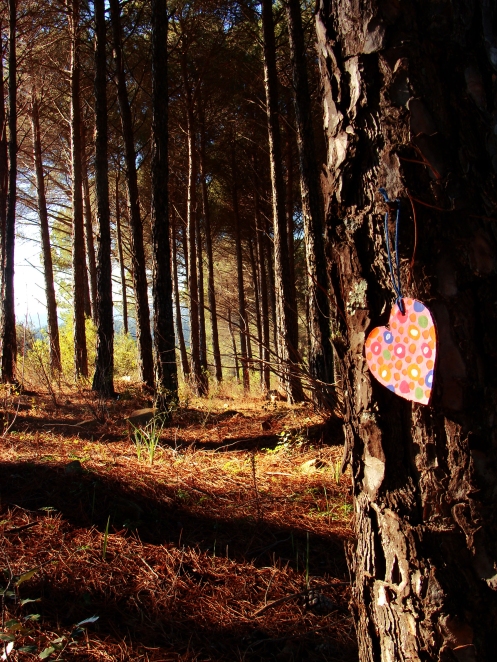
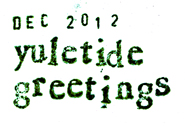
Happy seasonal greetings to everyone who has visited the Monkey & Sofia site over the last year, many, many thanks to you, it’s been lovely to feel that there is a connection between our life out here in the remoteness and other people, regardless of where their patch is in the world. It has meant a lot.
And now, after a busy time knitting and mailing out Monkey & Sofia goodies this last couple of months I am looking forward to getting back to my blog each month and sharing my ponderings with others. I hope you will enjoy reading it.
Actually, you might be reading this without having visited the blog before, in which case you can easily catch up with previous postings by scrolling down. And after you have read those, can be kept updated automatically, simply by clicking the ‘follow me’ box on the right, in the sidebar, then each time I post something you will receive an email version.
Meantime, I hope you are going to enjoy a peaceful and relaxing Christmas and that you will be looking forward to a particularly happy new year. We wish you all the very best, particularly for good health and a joyful spirit in 2013. Do continue to keep in touch and let us know your thoughts and ideas, or just how you’re getting on, we love to hear from you.
With love, Maureen xx
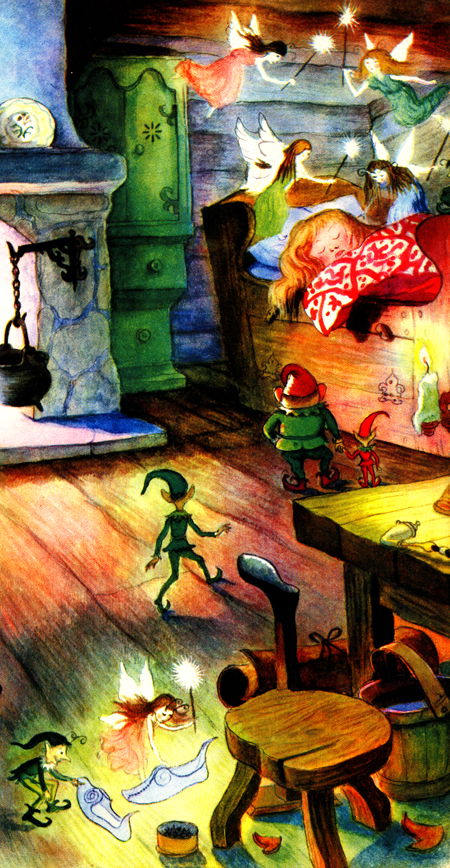
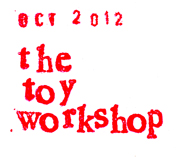 Inspirational reading this month comes from The Elves and Fairies Book, Golden Pleasure books, 1962. An odd choice certainly but somehow that, and a volume by Sherri S Tepper called The Family Tree, have been making me feel strangely connected to all sorts of natural spirits. Maybe it’s the books or maybe it’s the weather but here we are, clouds lapping white and silent outside our windows, rain pouring down like so many pine needles, of which there really are plenty too after a windy night, our feet on the track, silently padding over the carpet they make. In this heavy rain and greyness we work at our crafts by the light of candles since there hasn’t been any sun to light up our solar panels. However much we might plan to do this or that on any given day our activity is finally governed by what nature allows. Today it’s too wet to be outside getting on with our autumn programme of planting out young trees and too grey to fire-up the computer. Thankfully there’s always knitting!
Inspirational reading this month comes from The Elves and Fairies Book, Golden Pleasure books, 1962. An odd choice certainly but somehow that, and a volume by Sherri S Tepper called The Family Tree, have been making me feel strangely connected to all sorts of natural spirits. Maybe it’s the books or maybe it’s the weather but here we are, clouds lapping white and silent outside our windows, rain pouring down like so many pine needles, of which there really are plenty too after a windy night, our feet on the track, silently padding over the carpet they make. In this heavy rain and greyness we work at our crafts by the light of candles since there hasn’t been any sun to light up our solar panels. However much we might plan to do this or that on any given day our activity is finally governed by what nature allows. Today it’s too wet to be outside getting on with our autumn programme of planting out young trees and too grey to fire-up the computer. Thankfully there’s always knitting!
In Elves and Fairies, which is a lovely collection of traditional tales drawn together from different countries, including Sweden, a colder place than Spain definitely where they know how to survive a winter. One of the stories, Singeli’s Silver Slippers by Martha Ines Johnson, shows Singeli, the shoemakers daughter sewing away by candlelight, elves peeping through the windows behind her, just as I can imagine them peeping through ours on dark moonless nights. Our crafts at this time of year make us imagine Santa’s elves and I feel as if we are actually in that workshop, making our Monkey and Sofia toys. Sewing little felt shoes and miniature clothes, embroidering fabric elephants, knitting cats, mice and kittens as well as woolly socks for every size of feet. All of these things will carry our celebration of simple living out into the world, just as Father Christmas takes his helpers handiwork out with reindeer and sleigh. Certainly we are lucky not to have to rely on that ancient magic, just the modern version, the internet, but it is exciting to know that Monkey and Sofia toys have, and will be, travelling so far.
Sitting here on the sofa, in front of the glowing stove, deep in Sherri S Tepper or Elves and Fairies it’s kind of nice to realise that books such as these have been central to my life for as long as I can remember. Growing up in London with nothing of those magical worlds around me, they still felt strangely real, not just real in that they existed somewhere at some other time, but that those stories were about someone else’s real life and how it was meant to be lived.
Being here, even in the daylight of silent grey cloud, I feel lucky to have realised, thanks to those old stories, that this was the sort of life I wanted. And since we made the long journey from city dwelling to arriving here on our bit of hill it feels right to me to share what it feels like to be here. Just as those fairies stories showed me a different sort of living to me I hope that this blog, where I jot all my thoughts about the strangeness and wonderfulness of life here, might, just maybe, nurture that ‘running back to nature’ candle in anyone that happens to read it.
It is always amazing and wonderful to hear from others on their journey, so thank you to those many that have been in touch, I am always pleased that my jumbled thoughts actually meet people who understand them! Plus, thank you to the other many that have happily invited some of our knitted creatures into their lives. They might only be knitted creatures but they seem to bring something of the magic of life here on the hill with them. So since we are approaching the festive season, why not celebrate nature and remote living and spread the word amongst all your family and friends. Simple living rules!
Last weekend there was some perfect weather. Early on Sunday the sky was lit by the morning sun shining from its special autumn place, kind of low in the sky spreading out broad, soft rays. I set off to buy plants from other plant people in a little market square, even higher in the hills than here. I drove around the endless curves, the result of hillside living, while the sun warmed the trees and the colours to such perfection that I got that feeling of being exactly in the moment. The light was perfect; all I could see were trees, hills and light and I realised just how beautiful and amazing nature is and how lucky we are to live here. I don’t know what those spiritually inclined people might call it but I felt incredibly happy, as if life was open and big and that we were inside it. That probably doesn’t explain the feeling very well, but maybe a good comparison is the happy buzz you get after drinking very strong black coffee, that everything in the world is great.
I was concentrating on the difficult curves but all the while wondering what is it exactly, that can reach all the way from outside and touch something deep inside us and make that happy feeling? And how does it happen, is it connecting with our brains or something more fundamental and emotional?
It must be to do with weird, connective energy or something. Nature is trying to reach us and show us that we are part of something, that we have a real place in the wider picture; that everything is fine and we shouldn’t worry so much. It’s hard for us mere humans to appreciate that nature is massively bigger than we are and that instead of just looking at it, we need to understand our part in the picture. On rare occasions, like last weekend, something happens and we get some sense of it, but it’s transitory for us, we don’t have the ability to keep that feeling with us all the time, which is a shame because nature is there all the time.
I’ve been reading the stupendously lovely Narrow Dog to Wigan Pier by Terry Darlington, which I heartily recommend to everyone, and in this lovely book, interspersed with great observations about life, love and friendship there are some very evocative descriptions of nature as seen from a narrow boat. It’s wonderful, sort of seeing the world from water level and from the back of the country, rather than the front, or the view that everyone sees from roads, obviously it helps to have someone as brilliantly eloquent and poetic as Terry Darlington at the helm. Read it and be transported.
Thinking about that ‘buzz’ though, I wonder if it’s a matter of scale. That being in big nature makes us feel small and insignificant beside huge pine trees and intensely powerful weather and because of that, we have started using all of our senses. Hearing, smelling, seeing, feeling things, becoming aware of things. Here in the autumn it’s impossible not to notice the scent that the pine trees are giving off after the intense heat of summer or the rich dampness of the soil, thirstily gulping down the rain and the feast to the eyes of flames dancing in the stove over the logs we cut last winter.
The shorter days now bring colourful sunsets and sudden darkness falls before we are ready for the day to end. But we do notice that as we light our candles in the evening, we too are succumbing to nature’s rhythm. Just as the birds flutter and jostle for a good roost outside in the oak tree, sleep creeps towards us even though it’s only nine o’clock in the evening.
In a way, there’s something right about being governed by nature’s clock. It’s big, it’s powerful and we feel that it knows what’s best. Unlike human governors, we don’t have to worry about nature’s ulterior motives.
I’m sure that somewhere in the world there are people who really believe that by buying the latest skinny jeans, trainers or iphone they’ll feel that buzz of wonderfulness. But I think that maybe the anticipation of those buys is probably more intense than the eventual possession and definitely better than the moment of parting with a huge wad of cash. And of course, once that purchase is made, that’s it, it’s all over.
I know it’s a bit of a journey from skinny jeans to an amazingly, stunning, tree-covered hillside on a bright autumnal morning in Andalucía but maybe, just knowing that buzz is out there every day and it doesn’t cost anything, I hope it will make people feel less owned by the hungry spendy monster.
(photo by Nacho Suárez Obel – http://www.facebook.com/nacho.suarezobel)
Why is it that as soon as it seems as if we are going to get something we’ve been looking forward to, the thrill of getting it starts to diminish? Ever since the first intensely hot day of summer I’ve been looking forward to our compliment of autumnal storms. All through the bright blue days of summer I’ve had this vision of grey velvet clouds creeping across the sun, the valley full of mist and the resonant rumble of fully blown thunder. Now of course we’ve had our first storm and I’m all regretful about the inevitable passing of another summer. Perverse doesn’t even come close to describing these thoughts does it?
I’m sure it has something to do with the strength of the weather, as if it has its own personality or character, with the intense heat and sun of summer, it’s hard not to imagine it’s happy relaxed personality encouraging us to slow down, to take a siesta even if it were possible to stay awake all day when the temperature hits 40 degrees plus. Conversely when the brooding autumnal storms and torrential rain arrives it’s difficult not to worry about what might be washed or blown away, whether our solar panels might be struck by lightning or whether we’ll be able to get the van up the mudslide of a track.
Before we succumb to wet weather worry though we have to keep remembering that autumn is one of the loveliest seasons here. It can be sunny and hot enough to walk about in t shirts while not dissolving in sweaty, sticky heaps. The hillside greens up after that awful dull, dusty brown of summer and the whole place breaths and comes to life again.
It’s not easy to love a personality like summer here, despite the feeling that it’s urging us to relax, it’s way too harsh and overwhelming, the relentless and endless days of heat and yet more heat. Whereas the autumn, even with its storms, seems more human somehow. Now that I’ve so recently seen rain, I wonder if it’s to do with water. In the summer, when we are without it for so long it’s possible to imagine life coming to an end for lack of water. We are taken to our limit, but the autumn, with its incredible downpours restores us. It’s possible to feel thirsty on behalf of the earth just watching the rain fall on the bone dry soil.
I know that we are attempting to live closer to nature, but sometimes I wonder what that means, what it looks and feels like. Is it to do with just living away from other people, with only trees and hills for neighbours or is it being able to sink below the surface, get under the skin of nature and become the equivalent of the rocks or the weather? If that is what we’re aiming for, I’d like to understand how we can get there.
Well, I think I had a moment of clarity on all of that this week when, with the help of a local man, we took some honey from our beehive. We’ve had the hive for about eighteen months but until now hadn’t taken out any honey, mainly because we wanted the bees to settle in but also because they had turned out to be a particularly aggressive strain, so until we found the appropriate clothing going even close wasn’t an option. Anyhow this was the week that we got to see inside the hive. The incredible smell of honey and wax was intoxicating, the air around the hive thick with bees, buzzing louder and louder. They seemed to be held in the air by a thickness of heat and scent. The hive was welded shut with wax and it cracked apart when we levered open the top to see the frames inside. Wax combs curled above the structure as the bees, having run out of frames, began building on top. The golden yellow of the wax and deep brown of the propolis were such incredible colours and the precision of the cells in the honey comb were beyond amazing. As quickly as possible we removed just one frame and replaced it with an empty one before closing the lid to let the bees reclaim their space and reorder the hive.
An empty frame for the hive has no weight to it at all, it’s just flimsy wood and a thin laminate of wax for the bees to work on. The full frame which we removed weighed three and a half kilos, wax and honey. Surprisingly we didn’t drip our way down the hill from the hive, there was no honey to see just a knobbly, matt, waxy cover on either side of the frame.
It was a relief to leave the hot, buzzy atmosphere around the hive and return to the cool interior of the house. Now we could examine our treasure, see the thick cover which the bees had made to seal each cell of honey, marvel at the perfect shape of the empty cells near the edge of the frame and be amazed at the weight of the hidden honey. We balanced the frame over a wide, shallow dish and carefully, with a heated knife, sliced away the wax seal and immediately the wonderfully golden liquid began to flow. Honey isn’t new to us, but this was an entirely different experience. The colour a rich blend of dark copper and summer yellow, a kind of transparent orangey gold, the texture thick, stretchy and sticky. I imagined a spoonful would be as strong as half a jar of other honey. Almost as soon as the honey was released the house was filled with the scent of summer on the hillside; the flowers, the trees and the heat that releases the oils from the cistus and the pines. The dry dusty smell of the earth as it bakes under the sun and a thousand other scent traces which make up this place. Then there was the taste. It was irresistible not to dab fingers into the dripping honey, it was like a stack of smells transformed into an edible quality, kind of rich with fruit and a slightly bitter, a citrus, orangey flavour at the same time as being intensely sweet. It was incredible, like eating summer or understanding what the landscape tastes like. Weird really, but then, remembering my thoughts about living closer nature I realised that this was maybe it, sort of getting under the surface and experiencing, through the work of the bees, what it actually tastes like to live here, the flavour of the hillside, such a strange thought.
It reminded me of something I think I read a while back in a book by Richard Mabey called Nature Cure. I’ve tried to find the reference but couldn’t track it down, anyway, I’m sure he mentioned eating the landscape and I thought at the time it was a bit odd, although I could almost understand what he meant, it was just difficult to hold on to the feeling, never having had the experience myself. Theoretically I thought I’d got it, but now I really do. It’s about being another part rather than an extraneous being in nature. Now it feels as if we’ve had a close encounter or at least our closest yet, so when I am next wondering about living here I’ll always think of the help we had in understanding our relationship with it all from the humble or should I say, mighty honey bee.
‘Education isn’t for being something, education is for enjoying whatever you are. The only thing you have to be in life is yourself’.
The Corncrake and the Lysander by Finlay J Macdonald
I thought this was a wonderful quote, this idea about being yourself, it sounds so easy and obvious really, but for us, it’s only since we moved away from our own country and culture that either of us feel as if we are becoming ourselves. It’s hard to distance yourself from influences when you are surrounded on all sides by television, radio, newspapers, conversations in bars and buses. It all adds up. Sometimes only in a subconscious way, to influence our actions and how we see ourselves which that in turn, affects what we feel able to do.
And the education thing. In the past education really was for its own sake – to broaden us out as people, to expose us to a whole new world of theories, thoughts and the achievements and discoveries of different people. This exposure would show us how we could use our wisdom and abilities in whatever sphere we chose. That system seemed to be about valuing people for who they were. And underlying all of it was the knowledge that life itself was the most valuable thing we had, that there really was nothing else.
The more I think about this the more right it seems. The only thing you have to be is yourself and that surely means being the best version of yourself that you can.
I’ve been reading the Finlay J Macdonald Omnibus and marvelling at the lives of people on the island of Harris in the 1930’s. Living with just the basics but in a rich natural environment and culture, no running water, electricity, phones or cars, where daily life was composed of tasks necessary to existence. There was a school and parents urged their children to do well, knowing that the world was changing and thinking that education would be the best preparation for a place in it. I think they were hoping that their children would have a richer life and be able to take advantage of all the new things the world would have to offer. But I also think they were hoping that their children would still value their beginnings, their traditional way of living. That, to my mind would have been the best, although it was sad to think that the parents were preparing for their children to leave the island. I wonder if it could have been different. That the lives lived on crofts with sheep and the loom could have continued.
Anyhow, it was about children growing up to become the best version of themselves. Unlike today where it seems adult aspirations and the education system have buried those fine qualities under rather less poetic plans. Most young people and their families view education as the first step on the way to finding employment. Gone are the values of exposing children to the best of others achievements and encouraging them to take their place alongside the great people of the past. Now it’s all about work and money. The better the exam results, the better the possibilities of earning big money.
It’s sad isn’t it? After all, we only have one life and it’s not very long. When I read about those who lived in the 1930’s and 40’s I can’t help thinking they’d got it more right, the balance, the value of important things like keeping warm, providing their own food and clothing. No distance between what was needed and how it was provided.
Now things are more clouded. No one knows what the basics are any more and even less about how to provide them. It’s like a strange puzzle or maze. The people in the 30’s had little material comforts and were close to living and surviving. Now there is so much. So many things to want that they hide what is necessary and confuse people about the difference between what they want and what they need.
Maybe education really is the key. That if children aren’t valued for who they are, they start to think that they aren’t anyone. Society at the moment looks to be full of people who don’t know who they are. No wonder so many are depressed.
I know this all sounds like someone venting about how great the past was, but it wasn’t my past, it’s not a period of time that I remember so it’s not my personal nostalgia, it just happens that it really does feel that there was a time when things were more right for everyone than they are now. Even though that life on Harris was a while back now, it was actually composed of the same things that we all still need, however sophisticated some people think they have become. We all need to eat, sleep and keep warm and dry. It’s just that some people want to earn a fortune to do it and others just do it for themselves. Nothing in the world has changed that we don’t need to eat and sleep.
We might have forgotten that but living with cats has made me realise that other creatures haven’t. They’ve got it all worked out, food, shelter, a cosy place to sleep and each of them with their own personality and character, to which they are true. Put like that, life doesn’t seem to be that complicated; it’s our mistake to think that it is. Maybe everyone should get a cat and learn from the masters!
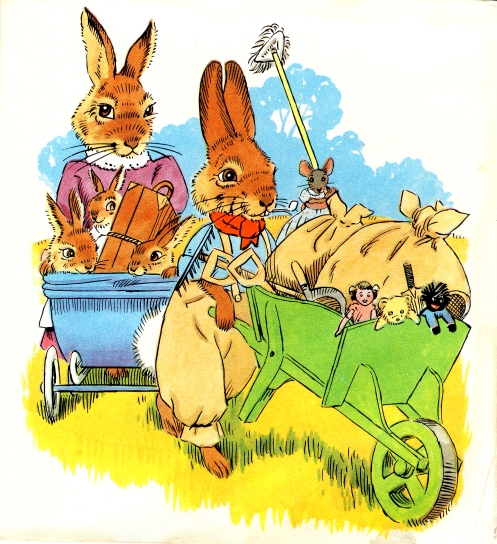
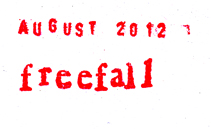
I’ve been wondering lately, as living here seems to make me do, about decisions and choices. About the things we choose to do or the values we choose as our own, as well as decisions about how we all live our lives.
It’s weird and rather lovely because in living here we have the luxury of being disconnected from all sorts of influence. Advertisers and other media as well as the subliminal pressures of family and friends have a job to reach us. And so our thoughts can ramble and stumble over ideas as we are inspired by the smallest of things. I can see that this is probably one of the things which confirms for friends that life here is a bit scary, because being cut loose like this means that we no longer ‘belong’ to a type. We are lost in the context of our old culture. It must happen to everyone who lives outside their home country, liberation from conventions, but where does that leave the individuals? It feels as if layers of stuff were peeled off. I’m not sure what stuff but maybe labels, the shorthand that others use to identify what kind of people we are, which in turn, reflects back on us and confirms our identities. Like what values, interests, jobs, wealth, skills and such that others have become adept at reading. I wonder how we would be read now, after twelve years outside. Not that it worries me really because I’m enjoying the freedom, although it definitely was scary to start with. Imagine someone with no home, no job, no clothes with identifiable labels and living in an old van in a foreign land. Even we didn’t know who we were. But I think one of our ideas for leaving our old life was to start with a blank slate – well, blank in a way but still carrying with us our experiences and the skills we had accumulated. I don’t think we realised that in our old life all our decisions were heavily coloured by that cultural shorthand. But having got over our initial shock of being out of its reach we started to make our new life, suddenly realising that we could make it using our very own set of references. We were also in a new culture which had its own ones but, as we were foreign to it, we were excused from all those pressures. Having hauled up here after a long search our slate was definitely clean all we had to do was decide what to put on it. The question was where to start.
People often say that they couldn’t live like us and I used to think they meant without a toilet, but I’m starting to realise that they meant the disconnection. I know there are people who come on holiday here and actually download their favourite newspaper every day. I wonder what ‘getting away from it all’ means to them. Obviously they worry about missing something, maybe dropping out of the loop is such a big thing or perhaps they feel that their place in the world is so tenuous that to miss the news for a few days would make them slip out of their place in the scheme of things. Yes, maybe that’s it. If you have to keep touching your reference points, what would happen to you if you didn’t do it for a bit?
I’ve been enjoying reading Mapp and Lucia by E.F. Benson this last couple of weeks and the way the characters obsessively keep in touch with each other is a really funny version of this endless contact. Trotting round, exchanging little bits of gossip about each other every single day. It’s a primitive form of Twitter! It really would be suffocating to be under that pressure every day, but I love the stories and am drawn to the people who live in Lucia’s world.
But back to my thoughts about decisions in the context of who we are. Is it easier or more difficult to live without leaning on either a society with its set of fashionable values or those of a religion or philosophy? Sometimes I think that if we belonged to an ‘ism’ or some such, things would be simple, we wouldn’t have to work out all our own answers we’d just reach for the big book of rules and would find a reassuring and simple answer. But I know I couldn’t settle for that, I’d miss the challenge of coming up with my own set. As we wrestle to make our life here we realise that our personal values are the same as ever, like being vegetarians, passionate gardeners and cat lovers. In fact all those things have become more important now and sitting alongside them is our embracing of the frugal. Yes, a weird kind of pared down living which, rather than making us feel that we are suffering under the burden of things lacking, we have become spritely in our enjoyment of finding new ways of living on less. It certainly celebrates creativity and the pull of consumerism no longer holds it’s magic. We have felt impervious to the recent global media bombardment to buy an i-pad, i-phone or kindle. Although, the fact that we know what they are means that we aren’t totally out of touch! But, like Lucia we are able to keep modern inventions in their place and not let them become central to our life. Although, I do disagree with Lucia on one or two things, mainly with her annexing of the gramophone! In our wind-up, solar-powered life, a set of 78’s and an old His Master’s Voice record player would be amazing. Still, we have our wind-up radio and can cruise into Portuguese or Spanish radio at a whim. Not the same as a set of Beethoven records but still, better than nothing!
(the image is from the cover of Mrs Nibble Moves House by Jane Pilgrim)
It’s amazing that there is so much to say about the weather. I had thought it was the British climate that made us complain or comment on the cold or rain, the clouds or sunny days, but no, it happens here too. I suppose you only have to live in a climate which constantly changes, seemingly without reason, to give you things to talk about and to be stunned at the power the weather has to affect our lives. I’m always looking for signs but something I am coming to realise is that however much we hope to interpret things, the weather still does as it pleases. As we all know, even the weather forecasters don’t get it right all the time and they have all sorts of gadgetry at their disposal. Here, people prefer local signs, like if the pine trees are blowing in the wind, it’s going to rain or if it’s misty at breakfast time, it’ll be fine by tea time and wind from the interior of Spain or across the Mediterranean is bad news, extreme heat. We’ve had some of that these last few days. The thermometer has been stuck between 39 and 43 degrees in the afternoon, no breeze at all and hot sticky nights without sleep. However we shouldn’t complain really because other parts of the country have reached more than 50 degrees. I can’t even imagine what that must feel like, especially since our little fans have been working overtime to keep us cool during our heatwave.
Yesterday we were in the pueblo and everyone was sharing what they had heard about the heat. That it was blowing directly from the Sahara or that is was peaking and tomorrow it would start to drop. It was comforting to know we all felt the same and there was some prediction for cooler times to come. It’s how we humans function I guess, having to know the how and what of everything so that we can accept things and the knowledge that we all feel the same is reassuring. Somehow our attempts to pull the horror of the heat into our own understanding diminishes its power, maybe that’s what we do with all experiences that come along and threaten to derail our lives. We look at events and at the signs then try and see if we could have predicted it or at least, guess when they’re going to end. It’s natural to try and understand things but I wonder if we could go too far with that.
When we set off on our adventure, leaving behind our life in Yorkshire, everyone asked us where we were going, what we would do when we got there, how we would survive. Amazingly we hadn’t given those things much thought, although as more people asked us, I did start to wonder myself. But it seemed too late by then to stop and give ourselves over to worry. Maybe we didn’t know it at the time, but in retrospect it appeared that we had been working on instinct, taking one step at a time in a direction that just seemed right.
I wonder if the need to work everything out in advance, to predict outcomes, is something we learn, because surely it can’t be natural can it? Certainly the workplace is full of training courses, helping us to parcel things up with certainty, but what about serendipity, fate, and fluke? I hope they haven’t been written out in favour of predictable results.
One of the very valuable things we learned on our rather exacting journey was that it is impossible to know what is round the corner or on the next page of our lives. In fact, that’s probably what we knew deep inside when we set off, but couldn’t express. We wanted to experience the not knowing, to trust fate and that our ability to deal with events would ultimately deliver us to where we wanted to be and that we would find our place by intuitively moving towards it. I know, maybe that sounds a bit fantastic and perhaps it’s easily said now that we’re here but actually, I think I believe it.
The thing is. Supposing everything that happens to us depends on our ability to imagine it. Or better, we imagine something incredible happening and it does, because we expect it to. So if that’s possible then maybe the reverse is also true. If we never thought anything incredible could happen, we wouldn’t spend time imagining what it would be like if it did. So, because we can’t imagine it, we can’t make it real to ourselves. Then when it does actually happen we can’t recognise it, confirming that our inability to imagine incredible things limits our lives.
Maybe if this is all true and everyone agrees that serendipity or imaginative results are what life should be made of, then maybe instead of worrying about the awful things that could lurk around the corner, we should encourage ourselves to predict good things because after all, if the future is unknown why imagine it’s only full of bad things? Perhaps we need to practice thinking about exciting things because they can surprise us and we need to learn how to respond and really celebrate them, although that sounds a bit like training and I’m not sure I’m a fan.
I’m all for sharing our woes on the scale of the weather but its nature’s serendipity which is admirable. While we’re in the middle of August I’m looking for signs that the summer is coming to an end. Even as we drag our hoses and watering cans around at sunset I’m hoping that summer has peaked and that I’ll see something, anything that hints of autumn. Last week I thought I saw a real sign. We’ve got some comfrey plants, some of which have died back in the heat. They did the same last year and then bounced back in the cooler weather, however the other evening I noticed that one clump had some tiny green shoots showing. Surely this must mean that the plant has superior powers of prediction and that autumn is definitely on the way, contrary to current temperatures. Or that the plant is thinking positively and imagining good things to come. I think that sounds brilliant, after all, plants must surely be closer to nature and the weather than we are so I reckon if a plant has imagined the cool of autumn is almost upon us, I’m certainly going to agree.
I know it’s the summer and we live in Andalucía but that’s no excuse for the extreme temperatures we’ve had of late. Up to the mid 30’s it’s definitely hot, but acceptable. Once it’s over 40 any sense of living normally disappears as everyone rushes around to get any necessary jobs done before midday when the heat begins to intensify. Windows are closed, doors, shutters and everyone is locked away in the cool darkness of the indoors. Air conditioning in offices now appears normal, I used to think it was an unnecessary luxury and a waste of electricity but in this terrible heat it would be impossible to work, not just because it is so uncomfortable but because I have realised that the heat fiddles with your brain.
In our case I’m not sure if it’s the necessity of being confined within our four walls or if it’s the sense that the sun isn’t the warm, yellow friend in the sky any more. On these hot days it is a frightening, higher power which gives off a nasty, intense, white light and somehow seems menacingly closer to the earth and far more dangerous than our usual sun. Everywhere looks colourless, the soil has turned to sandy dryness and plants that can’t stand it are fried. Obviously there are periods of heat like this every summer and fortunately they don’t usually last longer than about a week but while it’s so hot, life’s balance sways and ordinary events take on a nerve wracking potential. I don’t know why but it’s in this heat that the gradual construction of our little life here on the hill looks less possible, sort of temporary and fragile. The heat plays with our minds, tormenting us with anxieties of the ‘what if’ type. Like, supposing one of us fell and broke a leg how awful it would be to have to deal with getting to a hospital in the sheer blinding heat of the sun, intent on pushing temperatures past the mid forties. Or supposing a forest fire crept over the hill in front of us and up the valley, destroying everything. Would we escape? What would we snatch up to save? All these issues live with us in normal temperatures but the strangeness of the weather has made us feel less capable of dealing with anything.
It seems crazy that a few degrees of heat can have such an effect, but in a perverse way it feels sort of just, that our life is so tenuous, swaying and straining against the fine threads we have managed to secure ourselves with. Definitely when the weather shows its power we realise that for all the comfort of our little hut we are really just one step away from living outside in a tent and nature here is definitely more powerful than we are. Although mostly I feel sure that as time passes we will seize each new experience and stash it away ready to be dusted off when similar conditions come to torment us in future years.
Weird though, that fear should be so close and without our knowing it. We had begun to feel brave after the initial worries of being here had subsided, those early imaginative concerns laid to rest. And I think we have begun to accept a certain level of fearfulness is a part of this life. We have even begun to understand that perhaps it’s necessary to let fear trickle into our lives just to gain the experience in dealing with it. After all, scary things do exist and isn’t fear a valid emotion, just another to add to the many we’d rather not know about like sadness and worry? Maybe we need the full set to make us complete human beings. Needless to say that having realised this doesn’t make it any easier to calmly deal with fears when they arrive.
One of our biggest recurring worries is over our water supply which comes from a borehole. It’s thirty metres down to where the water is and a pump brings it to the surface where it travels through a pipe to be stored in our water tank. From there it either comes to the tap in the hut or to the watering system for all the young trees and plants. In this heat imaginations can run riot over water or the potential lack of it and recently we did such a good job of it that, as if by osmosis, the water pressure dropped and we discovered that the tank was empty. Our nightmare had become real. Possible horrific reasons burned in our minds, the pump had failed, pipes were leaking, various electrical things broken or worst of all, the borehole had run dry. Anxiety has its own special way of bunching scary things together and making a huge knotty ball of them, so that calm rational problem solving needed to sort through each possible answer takes a while to achieve, but eventually we got there and the tank is now full again.
Understanding and confidence seem to be the main defenders against fear, but each take a while to acquire. Sometimes I worry that it might be possible to get through life without gaining either, especially when we are anxiously tackling some new horror. But the upside is that having faced something scary and survived, it certainly feels as if you have added something to yourself. As if the line between safety and fear has been rubbed out and redrawn a bit further on. Well, maybe it feels like that for a bit before another of the menaces looks a bit bigger than before. However, this time, while we’re still feeling shiny from coming through the borehole thing, we’ve decided to tackle another of our torments. Our beehive, which is full of nasty, aggressive bees who are intent on attacking anyone who comes within fifty metres of their home. The hive is dripping with honey so we have to get in there and remove some and put in new frames. Hopefully we’ll survive and our new fear level will ease off a bit further, well, maybe. And even though the temperatures, which have cooled off this last day or so will make it easier I’ll still be going through the whole thing having touched wood and with my fingers crossed because, however much we understand the theory of being daring, no one can deny that basic superstition is an important and necessary part of increasing bravery levels can they?
Who would have thought that making a garden in a warmer climate would be so challenging? I suppose those wise people who’d given the idea some thought before assuming that sunnier weather would just mean an end to all those wet summers in Yorkshire and bring only lovely warm days. Of course, nothing’s that simple. To have more sun we have to have all the horrible stuff too, which means weeks of really hot sun to scorch and dry the plants into pale versions of themselves. Summer really is the worst time of year in our garden. We water every evening purely to keep the plants alive and they, being superior beings, don’t get all agitated like us but wait patiently, biding their time for better, cooler weather.
This week I’ve been reading a weird old book, written around 1940 by Marjorie Kinnan Rawlings, called Cross Creek. It’s a fascinating story about life on an orange plantation in Florida and bizarrely there are similarities between our climates, although they suffer colder times in the winter than we do. There was an exciting description of lighting fires amongst the orange trees to stop the ice from freezing the fruit. I do enjoy books like this one, full of passionate ambition to follow dreams, of moving from a life in the city and making a new one in a rural place, of triumph over adversity.
Older books are fascinating because life in those times seemed more intense and the challenges bigger, the difference between rural and urban life wider, so reading about it is all the more inspiring. Cross Creek is packed full of social history and personal battles as the writer makes a life for herself in a place she loves but has no experience of. I suppose then, as now, there were plenty of people who told her she was taking too big a risk in leaving her comfortable life in the city for certain disaster in the country, but then, that’s people for you!
I wonder if doom merchants advise us from the best or worst intentions. Are they really concerned about us or is it that some people feel the ripples of change from the lives around them, bumping up against their own too disconcerting. Sometimes when I talk to people about how our life is unfolding here I can tell they feel uncomfortable, and not just for us and our lack of toilet or bathroom, although I can see that might get them started, but more my talking seems to make them want to either consider their own life or, conversely, our conversation makes them NOT want to think about their own life at all, to close the door tightly and preserve everything as it is and make sure no outside influence can reach it. Is that fearfulness? Maybe it is, but I reckon securely bolted doors make for a lifetime at the barricade, trying to keep out whatever weirdness or strange possibility that might come knocking.
Talking about our adventure in living here people often want to know why we’re doing this to ourselves, I really do try to explain that we’re not suffering in any way and that having no toilet isn’t the difficulty they imagine. Life here is grand and, I say, I’d like to think that by living in this green, well, for part of the year, natural place we’ll live long and well. But most people don’t think it’s possible to live any longer than anyone else by trying to avoid dying. They tell us that we’ll be happy to leave here as we get older and greyer because that’s life. You get old, you get ill and then you die. Maybe they’re right and I will change my mind about all this at some point, but currently I like to imagine that by trying to live well and as healthily as possible maybe I will live longer or, at the very least, live without regular trips to the doctor’s surgery or having to be supported by a battery of drugs and health checks. I don’t want to hand over the responsibility for my health to anyone who won’t take it as seriously as me.
I suppose all these thoughts sparked by Marjorie Kinnan Rawlings are about living a life which requires a bit of effort and as far as I can see, there’s nothing wrong in that. Not everything is supposed to be easy, just imagine if it were, there’d be no need for invention or creativity and life would be extremely dull.
In our life here on the hill there’s always something to take us to the edge of our current knowledge and ability. Today the temperature in the shade is 40 degrees and our pressing need is for a bit of cool air. As luck would have it this morning’s trip to the post office revealed a parcel from our friend Dennis, inside which were two little fans salvaged from an old computer. So, today’s bit of effort has been in wiring them up and building a case for them so that they don’t dance across the table when we switch on. Of course, by-products of effort are frustration and satisfaction. On good days, and they increase with experience, satisfaction outweighs frustration.
We still have masses of work to do outside to make our garden, but we are beginning to understand the changing seasons a bit better and now know that eventually the hot weather will fade and cooler times will arrive. Then we’ll be able to get on with our continual struggle to introduce different trees and plants to the hillside. Yes, it’s definitely important to make an effort and never to lose sight of the reward for that, which in our case will be a beautiful and diversely planted garden. However, we all need short term gratification and ours is the frequent indulgence in cups of espresso coffee, speaking of which…….
There’s something fundamentally right about post, you know, stamps, letters, parcels. I don’t know whether my strength of feeling about good old fashioned letters is the result of living far away from friends or what. After all, email is much more immediate isn’t it? Well, yes and no. Yes if you can get on line, no if you can’t. It’s more difficult for us to use the internet because we live out of the range of local aerials so have to go somewhere to connect. And anyway, receiving mail is just nice. Interestingly, I just noticed that even I, a letter lover have, have used the words ‘old fashioned’ about it. What’s wrong with that? Well surely, old fashioned hints at out of datedness, quaint, old timey. Something we don’t consider modern, technological and so, of inferior value. But in the case of letters, I love them and I’m happy to side with the old fashioned on this one. Anyway, collecting our letters from the post office this week I was pleased to see a letter from a friend in her 80’s, which incidentally, is another thing. All of our best letter writing pals are 70 at youngest and almost 90 at the top end, I worry about where all our under 70 year-old letter writers have got to. Well, I know really, they’re emailers, but it’s not the same is it? Anyway, this letter from the friend in her 80’s was, as usual, full of great stuff. She’s interesting, wise, clever and always passes on things that she’s discovered about all sorts of things. We hear from her a fair bit and not for the first time I’d wondered why the world generally isn’t interested in the wisdom of older people. It strikes me as total madness for society not to learn from clever people who have lived for years and know so much, particularly as every intelligent person knows; the planet is going down the toilet. Surely older folks ought to be brought together to work out the solution because certainly self-interested politicians and businessmen are definitely not going to be our salvation. A recent re-reading of A Short History of Progress by Ronald Wright made that much absolutely obvious. And, frankly, anyone who thinks the planet is being looked after by those rogues ought to read this book! Its underlying theme is our love affair with progress, which really means our obsession with everything which is a newer, bigger, faster, shinier and more modern version of the thing that we had before. This complete fascination with progress is making us blind to all the good things from our past.
The other really sad thing is that people are being completely hoodwinked into thinking that they can have absolutely everything. Advertising has persuaded people, and many of them seem to think they are entitled to have whatever they want, personal freedom being paramount, and as long as they recycle their old newspapers, the world will be saved.
The book’s other theme, which is really the bigger problem, is population growth. I think everyone knows that the number of people on the planet is growing fast but until you look at the numbers it’s hard to grasp the real horror, which is the speed that this is happening. For example, look at the figures and notice how long it took to get from one billion to two and then look at what’s been happening since 1960:
World population
1804 1 billion
1927 2 billion
1960 3 billion
1974 4 billion
1987 5 billion
1999 6 billion
2012 7 billion
The thing that really struck me was that if all the politicians in the world know about these numbers, why aren’t they doing anything? It’s so serious that they shouldn’t be doing anything other than trying to come up with a solution. After all, as the book shows, we’ve let them sit on high and tell us they’re in charge since way back in time, so now they need to show that they are worthy of all that trust. The issue of wisdom is the key. The book shows how, over the centuries powerful people; kings, politicians, influential rich people have ignored what the past has had to teach us; the mistakes as well as all the successes. It’s all there in history books; why societies collapsed, why people starved and why people had to leave their homes having used up every resource the land had to offer. Good grief, the piece about Easter Island is so sad! So, why does it keep on happening? Obviously it’s the obsession with the new and shiny, the next big thing; the space age, the technological revolution and so on. Nothing from the past is allowed to stand in the way progress.
But, here’s an example or two of how things from our recent past were better. The first is railways. Before the decimation of local railway lines there was an excellent interconnected network of stations and trains throughout the UK. Just imagine the impact that system would have had in this era of pollution, clogged roads and congestion charges. Too late now though, all destroyed. The other example is the postal service. Years ago there were more collections and more deliveries than today. I can remember receiving a birthday card, from my grandma at my birthday tea, which she had posted that morning. It makes me chilled to realise how much we’ve lost for nothing.
We live in a society where youth is worshipped like all other new things. But not valuing our past achievements and those people who know so much about them leaves us the poorer. I know most people really do believe that people from the past weren’t like us, that they wore strange clothes and lived in a different way. Well maybe they did but they still thought exactly like us. Reading books, especially funny ones like Three Men in a Boat, makes us realise that the excuse we give ourselves for not valuing older people particularly, that they aren’t like us is total rubbish. They were exactly like us.
Maybe if we stopped worshipping youth culture and new gadgets we’d appreciate things from the past and then the whole, awful speeded-upness of so called progress will start to slow. I’m definitely making a list of what those things are and mail is definitely on it. My next job will be to persuade the post office to reduce their ridiculously high prices. I can feel a campaign coming on!
It’s weird isn’t it, how seemingly easy it is to programme us human beings? I suppose that’s how society works, people somehow having similar aims or aspirations and then going about fulfilling them in the same way. Like getting up early in the morning and going to work. We start being programmed into this by having to go to school and it continues when we go to work. It wasn’t something I spent a lot of time thinking about when I was working, that’s the thing about human beings, we settle for certain givens and don’t think to really consider them at any point. But then we threw up our old life and my job went, along with everything else. No more rising at 6.00am and hitting the road at 6.45am, eleven years of that was enough. You’d think that the luxury of having no alarm clock would have been wonderful, I certainly thought it would be, but it took a long time before I could enjoy it, such was the overwhelming programming. For ages I woke up at around six or seven and virtually leapt out of bed. My heart pounding while I tried to remember what it was I had to worry about. I was so accustomed to having a head full of tasks to be sorted, considered or solved that when I was in my old life, I’d hit the carpet at a run, already fired up. Actually I realised later that I had trained my mind to wake up ten minutes before the alarm so that it could start powering up ready for that leap out of bed. When I stopped doing it my body took time to adjust. Even when we were living in our van it still happened, and when we were living in the mountains of Galicia I still had it. Eventually I realised I had managed to wrestle free of it when we were living in Portugal where I woke to the luxury of getting up in my own time.
Apparently the waking up panic is a thing, a phenomena or something. I remember getting an email from a friend who told me about a friend of hers who had given up her stressful job and had gone to live in Wales. Every morning she woke up wracked with panic and worse, worried about her decision to leave the world of stress. How would she survive? What had she done? She worried that she’d never get a job again, or be able to return to the city etc. etc. It was strange to hear that it wasn’t a personal madness and I always hoped that the friend got through it.
Obviously having been programmed into thinking that anxiety is a normal state and that it’s necessary in order to achieve anything, I didn’t stop worrying about things even after I’d convinced my brain to stop going into overdrive at the crack of dawn. I seamlessly channelled my worries into thinking about the future. Always a rich seam, which I have begun to believe, is positioned in exactly the right place to kick in after the other anxiety waned, at the point of breaking free. The future, the unknown, the bogeyman, the thing which keeps everyone working tirelessly, just in case. Strange isn’t it how our brains and the status quo kind of collude to keep everyone in their place.
Going into freefall after leaving work and moving to a foreign country was never going to be anything other than worrying, and it was hard. It was particularly difficult because I didn’t know anyone else who’d done it, so there wasn’t anyone who I could email and whine to. But eventually I discovered a couple of important things; the first was that being able to maintain a high level of anxiety is impossible because eventually it becomes just a mundane worry. And the second thing was to accept that time should just be allowed to exist and pass, that it wasn’t necessary to fill it. I know people who continue to run their lives as if they were in a job after they’ve retired, filling their days with stuff, jobs that needed doing, appointments, meeting people, going to events, or visits to this or that place. I realised that stuffing time full of external ‘must-do’s’ was just a way of replacing one busy life with another, so if I did that, what would have been the point in my changing my life?
However, despite having made these discoveries I still pondered what I was supposed to do with my time and worried about wasting it and just how terribly embarrassing it would be to have given up everything for nothing. Well, nothing amazing or tangible anyway. But then, that idea of success can only be measured by a stick from the conventional view of things. What I now know is that I’m trying to discover the something which makes me feel that I’ve succeeded. An intangible something, not governed or measured in the usual way by large sums of money or incredible fame. What I’m aiming to do it is to discover that thing, or those things which make me feel I’ve got somewhere, travelled a distance from my old life, learned to look at things differently and found a new way of living my life, a way which hasn’t been programmed or predicted by anyone, but one which is meaningful only to me. I hope I find it and I accept that maybe I’ll be looking for a long time, but, I do have a strong sense that the search is going to turn out to be part of the answer so in that case, I’m already on my way.
Here the spring is about the best time of the year. It’s warm, even hot on some days, but not like the summer when the days are stifling and never cool down. In spring we sometimes have cooler, cloudy days and the nights are still comfortable enough to sleep with breezes blowing through the mosquito screens on the windows. It’s weird because the weather really does dominate around here, whatever time of year it is. I remember that we wanted to live closer to nature when we left Yorkshire, to set out and find our new home, but we didn’t really understand what that meant then, or what it might feel like. There the only time the weather affected us was in a snowy winter when roads were closed and no one could go anywhere. It was exciting, I’d always wanted to get snowed in and it did happen. Here though, no matter what the season the weather is always number one. The excessive heat of summer, the cold winter winds, and the wild autumnal storms with their torrential rain, there’s always something to watch out for, a danger to prepare for. Maybe that’s why I don’t feel the urge to go anywhere, but stay safely and comfortably at home. Maybe it’s that or perhaps it’s because we took so long to find our home the notion of travelling anywhere now just brings back memories of when we didn’t have one. Or because it’s just so lovely here, why would we want to go anywhere else?
I’ve been thinking about it lately, travelling, because several people we know have been telling us of their plans to go off to far away places and I have been trying to understand why these conversations have left me unimpressed. I didn’t feel excited for them or get the urge to pack my bags, why was that? After all, in modern day ‘cool currency’ isn’t being a traveller way up there? Everyone wants to be a traveller, don’t they? Well, apparently everyone apart from me. I’ve been wondering if this lack of urge has got something to do with people earnestly believing that their lives will be changed by their travelling. That people will see them differently? Yes, definitely people will see them differently, they’ll be seen as coolsters, hip beyond hipness, but why? Surely anyone can buy a ticket to an outlandish destination, does that make them changed as people? I don’t think so. My other thought was about the insides and the outsides of people, insides being the real person and outsides just what others see. Surely to change your life you need to change something about your inside, to make some sort of personal effort don’t you? Have thoughts? Change how you live? Set out to do or achieve something? Perhaps this simply going somewhere far away and saying ‘look at me’ is what gets my goat. It’s as if a life changing holiday is just another thing on the consumers ‘must have’ list of purchases.
While I was mulling these thoughts I was drawn to the bookcase again. Had I not recently read somewhere, someone else’s thoughts about travelling? Yes I had:
…At a time when everyone seems to be tripping off on a prestige vacation to New Zealand or Tibet, I’d rather not compete. Travel to foreign countries always feels sort of sad and voyeuristic to me anyhow. To truly enjoy a place and feel I’ve got the right to be there, I have to be able to imagine myself living there.
(Barton Sutter – Cold Comfort, Life at the Top of the Map)
Now that strikes a chord with me, good old Bart Sutter, he manages to un-jumble all those thoughts and ideas tumbling about in my empty head. The sad voyeuristic thing reminded me of seeing holiday makers in the Algarve, plodding miserably around in the heat, looking lost and out of place. Holidays really are misery-making for all the people involved, especially the locals whose once quiet rural place has been buried under concrete. And it’s not even just about package holiday makers, what about those people who go and climb Everest? Obviously in search of their life changing experience and then leaving the place full of litter and rubbish. Horrible. I have absolutely started to believe that some places should be left alone. High mountains, deep seas, cold icy places, really, just let them be.
Yes, I know it’s all very well for me to tell people they can’t go on holiday when I live somewhere like this, but. But, our finally arriving here was the result of many years real, life changing thought and struggle. We gave up a particular kind of life and put a lot of effort into making a new one. I don’t think we’re special, anyone can do it and the sense of achievement is definitely far greater than an overland trip to Outer Mongolia. After all, at some point travellers to all exotic destinations have to come home. Real life changing action means you never have to. You make your new life and never go back to the old one.
Here’s another bit of Bart Sutter:
…..I drove this road some thirty years ago, with an older cousin who went on to work as an ornithologist in Ecuador or Borneo. Northern Minnesota is exotic enough for me. Travel, they keep telling me, is broadening. But I don’t want to be broad. I’m after depth.
The brain insists on novelty, constant stimulation, but the soul desires the same old thing, renewed again and again.
I know now I’m after depth. Really that’s the thing. I realise that telling friends I’m going for depth therefore, staying home, is not going to ring those cool chimes but maybe a new trend can be set. I reckon it’s about time to think soulfully and not take the holiday that you think will change your life. Why not join the new trendsetters, stay home and work on your soul.
We’ve had some really hot weather recently. Summer suddenly arrived without warning, temperatures jumping from the chill of winter up to the summer heat of more than thirty degrees, virtually overnight. Sending us burrowing through boxes and old vegetable crates for our summer clothes and then to the shed to dig out mosquito screens for the windows. Amazed at the intense heat we brushed winter’s debris off the porch, re- stacked all the logs back in the store, and unearthed the little table where we sit to have our coffee in the mornings.
Once summer’s here, it’s really only possible to do any outdoor jobs in the early morning, it gets too hot to do anything after about eleven o’clock, and although we’ve lived in this climate for more than ten years, every year this fact is a revelation. Eventually we accept that we have to adjust our activities according to the sun and slow down. All the heavy, outdoor work has to wait until the cooler times of the autumn, meanwhile we can enjoy the big change in the seasons by drawing, writing, reading, thinking and of course knitting in the cool of our little house.
Anyway, it was on one of these recent hot days when I was adjusting, by lying on the sofa and re-reading Dan Price’s wonderful book The Moonlight Chronicles (click to be redirected), that I came across a paragraph which got me thinking:
…”just the other day I was having these thoughts about how everyone seems to be absorbing all the hyped up cultural noise nowadays of TV, music and radio news, magazines and computers. And how that can clutter up a mind so thoroughly that a person can reach 20 or even 40 and hardly have had any original thoughts of their own”
That really struck me as true, both the bit about hyped up cultural noise and the part about original thought. We haven’t had a television for more than twenty years now, because we decided, way back then, to free our minds from all that jangling noise and use the time for making things. We were absolutely amazed at how much time we gained and how free we felt. Our friends laughed and thought we were just crazy and vaguely eccentric, in a folksy sort of way. But that wrench out of the clasps of television’s grip was the start of our road to freedom. Oddly, we began to notice we were out of step with other people’s thinking and that we were having more of our own ideas about stuff than before. As time passed and our thoughts started to blossom we realised that we needed more distance from the clatter and noise of modern life, which is why we headed out and eventually landed here on our hillside.
But stepping outside the norm can provoke strong reactions and when people discover we don’t have a television they are amazed. They wonder how we can survive without taking in everything it has to offer, the news, the nature programmes and the documentaries. How can we understand the problems the world faces without a television? Maybe they conclude that we are self-centred and unfeeling about the world’s ills and not as well informed as we should be. I re-read Dan Price’s quote again, my mind whirring with thoughts about ‘cultural noise’ then I remembered reading something else in another book recently, to do with the television and newspapers so went to scan the bookshelves. I found it in The House by the Shore by Alison Johnson:
……” we ban television and daily papers with their scab-picking anxieties and human-centred drivelling….”
I can really understand what she meant, the scab picking thing, because really what can we do about all the human-caused horrors in the world by watching television or reading the newspapers? It’s just misery making and is set to drive everyone’s thinking in the same direction. As Dan Price says, for all this explosion in media there’s hardly an original thought out there anymore. It’s as if people’s minds are being weakened by excessive watching of junk programmes which provide acceptable off-the- shelf ideas, or even answers to problems which everyone immediately buys into. Somehow it seems more important to share the same view as everyone else, than to stand out with some individual or unique thinking. Being in step, in line, in tune has become vital. With the explosion of 24 hour news stations and endless internet access the world has become obsessed with information but has it helped the world’s problems? No. Does the population of the world really understand what’s going on out there? Of course not. So really television is just entertainment, for those who enjoy that kind of thing, nothing more profound than that. Take it or leave it. I’m definitely leaving it, there’s too much else I want to learn about and experience for myself, as well as all the things I want to do like reading good books, writing stuff, knitting toys and so much more without the endless buzz of the television set in the corner trying to gobble up time and spew out rubbish. Try it yourself, you’ll definitely feel better for it!
Tune out, make a break for freedom.
We used to live in an ordinary house in Yorkshire, with ordinary things like mains electricity, hot water, a bathroom and a toilet. We never gave them a thought, they were givens. Well, we did sometimes give them a thought, particularly when the bills came and the standing charges for the electricity and the phone were always more than our usage. Try as we might to save on electricity and phone calls, we could never get rid of that standing charge and it wrinkled.
Now we have our solar panels and our solitary battery. It’s us and the sun. Will we have electricity or won’t we? I like that kind of simplicity, power or no power. There are plenty of people around here who, like us, live with only solar power, but they mostly have bigger systems, ones which allow fridges, washing machines, vacuum cleaners and televisions. No one would know that they weren’t on mains power unless there was a long period of grey skies and no sun. However, we enjoy the simplicity of our basic model, sun or no sun, power or no power, even though people often tell us we should get another panel or a bigger battery. We never feel tempted, our small set up feels right, we don’t have a washing machine, a fridge or a vacuum cleaner but we don’t want them. Somehow it’s satisfying to be able to live just as we please, without too much of anything. If we want to watch a film on the computer one evening, we can as long as it’s been sunny and we don’t want to have a light on too. I don’t think there’s anything wrong with that, it feels about right, the value of our electricity and what we can use it for. We have found that our version of simple living means making decisions like this, sensible, small decisions based on how important something is.
Thinking of the worth of things reminds me of how I suddenly felt the value of money when I didn’t have a salary arriving in my bank account every month. I’d got used to it but I’d never really felt its worth. I suppose because it was already spoken for in standing orders and other bills, just disappearing without ever actually being in my hands. In our current life I might earn a few Euros teaching English but those Euros feel as if they have real value when I weigh them up against my week’s grocery bill. There’s a certain satisfaction when things balance with each other, as if the value of each part is right. Isn’t there some Dickensian quote about having sixpence and spending five pence h’penny and being happy? I think he got that right but our thing isn’t just about living within our financial limit, it’s more to do with a certain type of frugality which really appeals. I know that goes against the modern world’s flabby excess where more and more can never be the end, because more and more and more of anything can never satisfy, while more and more exists. The thing that continues to interest me is just how little is enough. How little money, how little electricity, how little a wardrobe or how little of anything really, is enough for us to survive and feel happy.
Strangely, I now realise that a lot of anything has never felt right to me. Well, a lot of material things anyhow, because obviously a lot of time would be different. Time is something we try our very best to get more of but there’s just one amount. The skill is making it feel like more. I know that our decision to live as we do was actually based on our wanting to be responsible for our own time, trying to value each bit of it; seconds, minutes, hours, days, weeks, months, years. We wanted to know that we had got as much as possible from it all. Consciously trying not to waste any or use it unwisely by trading it for something which had no value. We stumbled into it really while feeling depressed by boring jobs and feeling confined by our bills. Suddenly we realised that by deciding to change how we lived we could be free of all that stuff. We could decided what would be in our life and what wouldn’t, what was important and what wasn’t and what we would have to do without in order to have the things we wanted, all creative decision making. I’m sure our life must seem like some kind of madness to many people but it makes complete sense to us. We have our own rule of thumb or philosophy or whatever, which we arrived at by relying on our instincts rather than using anyone else’s set of rules and yes, much-ness or excess does have its place but only for measuring time and other exciting, creative endeavours and particularly our garden of plants and trees; important stuff like that. Everything else is down to the minimum nowadays, including our electricity bill.
I think there are many people who would agree that knitting is a wonderfully creative craft. It seems to combine an engrossing process leading to a unique product, although, despite it having so much to recommend it, I still feel a bit embarrassed when I admit to being a knitter. Perhaps because I came to it a long time ago and don’t quite feel that the modern image of stylish coolster knitting in fashionably urban venues like art galleries or funky cafes applies to me. I’m from the ‘in the closet’ school of knitters, people who knitted through the unfashionable era and never dreamed of admitting their habit to friends or colleagues for fear of quizzical looks or even derision. But even though it’s now very much OK to be a knitter, I still feel a slight unease when I think about the amount of time I spend doing it.
Maybe I think I should be spending my time doing something a bit more worthy, less enjoyable, perhaps something more stressful and less agreeable. I have to admit though that I really enjoy knitting the toys, Monkey and Sofia, and all the others I have invented, but I have noticed a creeping guilt about the possible waste of time involved. I also worry about enjoying it as much as I do, especially making the same things again and again. Surely my capacity for repetitive activity hints at a certain dullness, and who wants to be considered dull? However, in trying to justify my enthusiasm for knitting I have given it quite a lot of thought and now wonder if I haven’t stumbled into a particular form of meditation. It seems that knitting toys has a special contemplative value, to me anyway, and I rather like the idea of this because it lends those little creatures a higher status than just being what they are and this makes me feel better about the whole thing. Therapeutic knitting, happy knitting? Certainly it makes me happy, which is definitely a good thing, and while I’m making a list of the positive aspects of my knitting I could also add that in terms of simple living knitting has much to recommend it. No need for expensive technology or even electricity because I have found that it’s possible to knit by candlelight so it is perfect in that regard. Plus there is the possible recycling aspect, the reusing of old yarn, swapping with other knitters, while of course wool is natural so that too gives it a certain wholesome quality. Surely such worthiness couldn’t be linked to time wasting or even indulgence could it? Now we are getting to my hidden concern. Am I wasting my life? I have to say that having given this little worry a good chewing over my answer is, of course not. However much I like to dress up my enthusiasm for knitting in all sorts of fancy and intellectual clothes I am knitting because I like to, and what makes that such a bad thing? Perhaps living out on a bit of hillside has helped me put all these crazy considerations into perspective. The longer we’re here, and we haven’t been here that long yet, we are starting to realise that nature has its own logic and connection to time. It’s very difficult enough for us to understand its patterns when they manifest into weather or the seasons let alone any greater powers. It’s as if we are perched on the surface of something much bigger than us, and as we struggle to become a part of it we try to place our life and what we do each day in the context of something wider. Maybe I have managed to connect with a deep personal rhythm when I knit the same thing over and over, and that’s why it feels right. Who knows? But I don’t think I’ll spend any more time worrying over it, I’ll just enjoy my knitting.
When we lived in Portugal we rented a little house and our nearest neighbours worked the land which surrounded us. Agosto was in his early seventies and Maria late sixties, and every day they were out there working. This was our first encounter with anyone who grew food, both for themselves and to sell at the local market, and a climate where it was possible to grow not only lots of different things but all year round.
It wasn’t just the variety and volume of what they produced that amazed us, but how they went about it. No big performance, no puffing and panting, no drama. Just going at a steady rate, like they had something like an innate timetable they were working to. Sometimes Maria talked about the full moon, or particular celebrations on the calendar like Easter or Christmas, which she said were indicators of when she could plant certain things or when they would likely be ready to harvest. But really those things weren’t that significant, Maria talked of them more as if she was trying to justify why she had decided to plant something when she had. Meanwhile the planting, weeding, hoeing, and preparing beds continued every day, it was the backdrop to everyday life.
I’ve admired that rhythm ever since. Maria and Agosto attending to the important things, and not just growing fruit and vegetables, but making bread in the wood oven, cutting firewood, picking and bottling olives, harvesting the grapes to make wine. This was their life, centred around their home and its land. Maybe, after a period of tuning in, we’ll become like them, connecting to what our land tells us and gradually understanding what we need to do in order to provide for ourselves.
This feeling is really strong. It’s like that theory, the one about us having forgotten how and why we came to be here. Apparently it’s all there in our DNA or somewhere but we have buried it, and in the process become disconnected from our real purpose our connection to the natural world. Now being here and having had the Agosto and Maria experience perhaps we’re on our way back at long last to rediscovering it. Maybe it’s what I was talking about before, not just a magnetic link but finding the key. Anyway, the right time, right place, rhythm, something seems to be working and making sense.
Living where we do is an experience. Maybe because we come from London where to look at the sky from inside our house we had to get near a window and crane our necks upwards to get a glimpse. I’ve been thinking about the sky a lot recently, especially in relation to all the moving we’ve done over the years. Maybe it was to do with getting ourselves a bit more of that sky, a few inches more with every move.
Now we virtually live up in it.
Like the sea, sky is one of nature’s biggest elements, and in our restless search for more of it maybe we were trying also to find a place where we belonged. Somewhere we could exhale and just be ourselves, the people we were meant to be.
That sounds like a reasonable theory but I’ve always wondered about the spiritual side, you know the one about learning to just be, finding the answer with great sunsets and deserted beaches. The thing is I’ve never been able to join other people’s clubs. However, at the moment, I do feel as though I am heading towards my own answer.
It’s as if I’m slipping under a spell, becoming mesmerized just by living here, and weirdly, for the first time, resenting having to go out, away from it. Shopping, something that only happens twice a week, now feels as odious as an entire morning spent in a busy shopping centre. But what’s a couple of hours? I can’t really say why I feel like this, but here in our hut on the hillside, able to get on with making things, work away on the garden, seems to connect us to something a lot bigger.
Being surrounded by so much nature is hypnotic. It’s a place where you can feel utter stillness and silence. Where every minute, day or night, the changes in light affect how we see things, the wind constantly changes direction and mood, where sometimes even with no apparent breeze the pines are bending at their tops. Where rain is a mystical experience, and clouds float by below us. It all sounds so delightful, who wouldn’t want to spend their days here? But my need is more, a fierce strong thing with an amazing pull from somewhere I can’t even imagine, and it’s as if I really must be here. Like some magnetic force inside me has brought me to this place, and finally we have locked together as we were meant to. An odd feeling yes, but for all that, a good one.
When we set out on our journey to find this place I worried about what would happen when we let go of so many of our ties, all those things which gave us a sense of who we were. Would we still be the same without all those points of reference? Well, we all carry our past with us, so in part we are still the same. But as we are now finally settling into our real home it’s becoming clear that we’re going to be much more too. Bizarrely, living here surrounded by so many trees, rocks, and infinite sky, it has provided us with the connection, to something which is making us feel more and more creative. As well as more fulfilled. By tuning into this place, making our garden, solving all the problems that come up, and learning a mass of new things every day, we are being filled with new potential. Maybe then the staying home thing is as much about the compulsion to create as with communing with nature, but whatever it is it definitely feels like a good thing.

